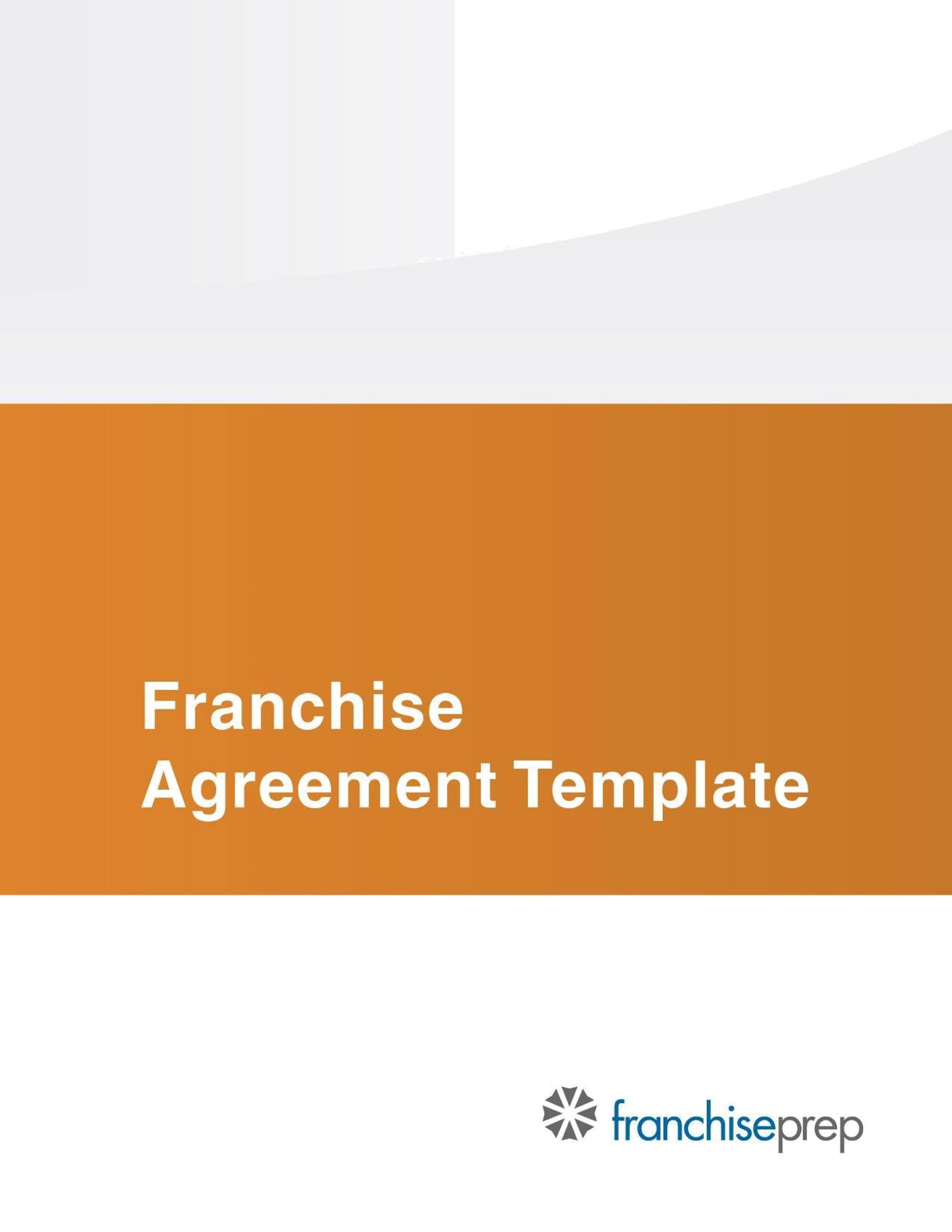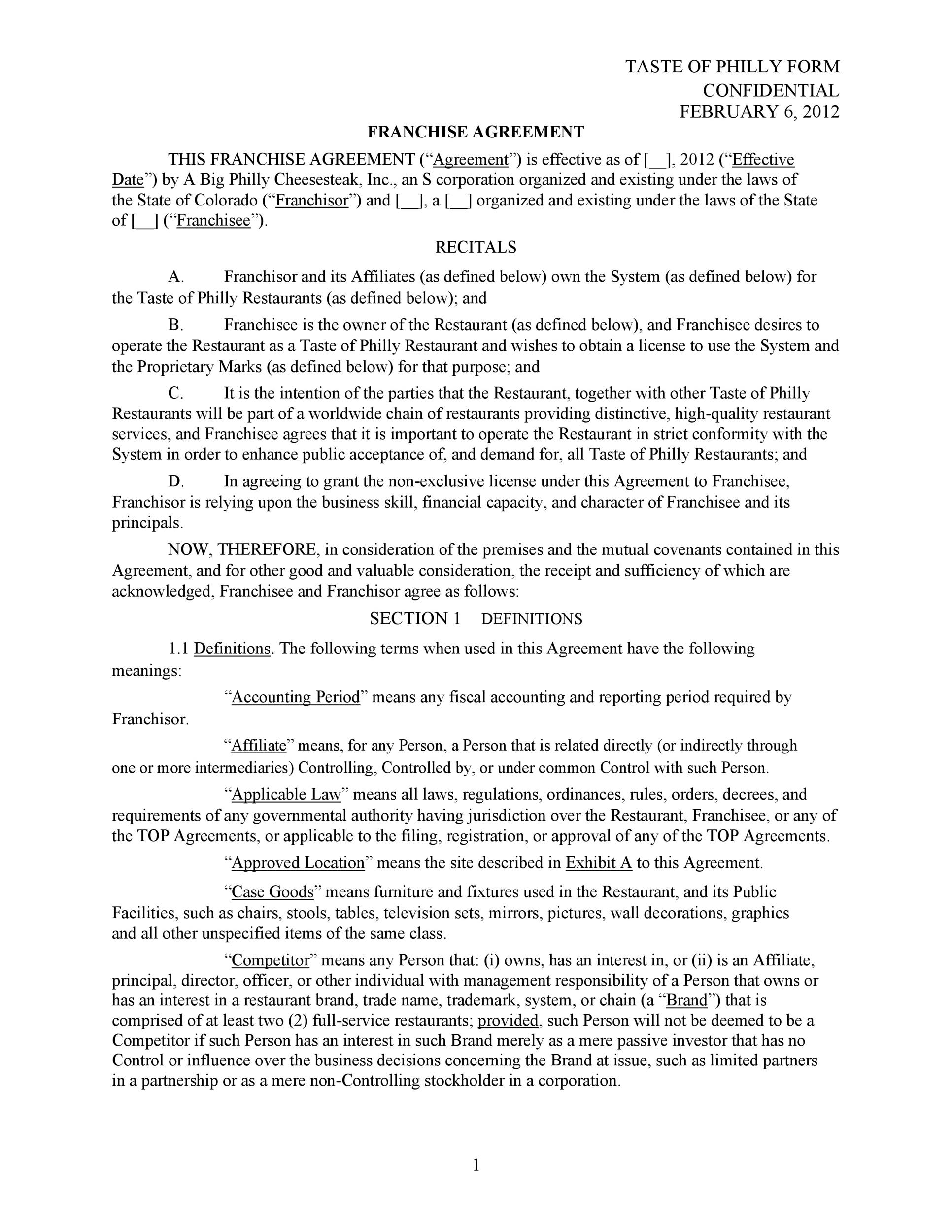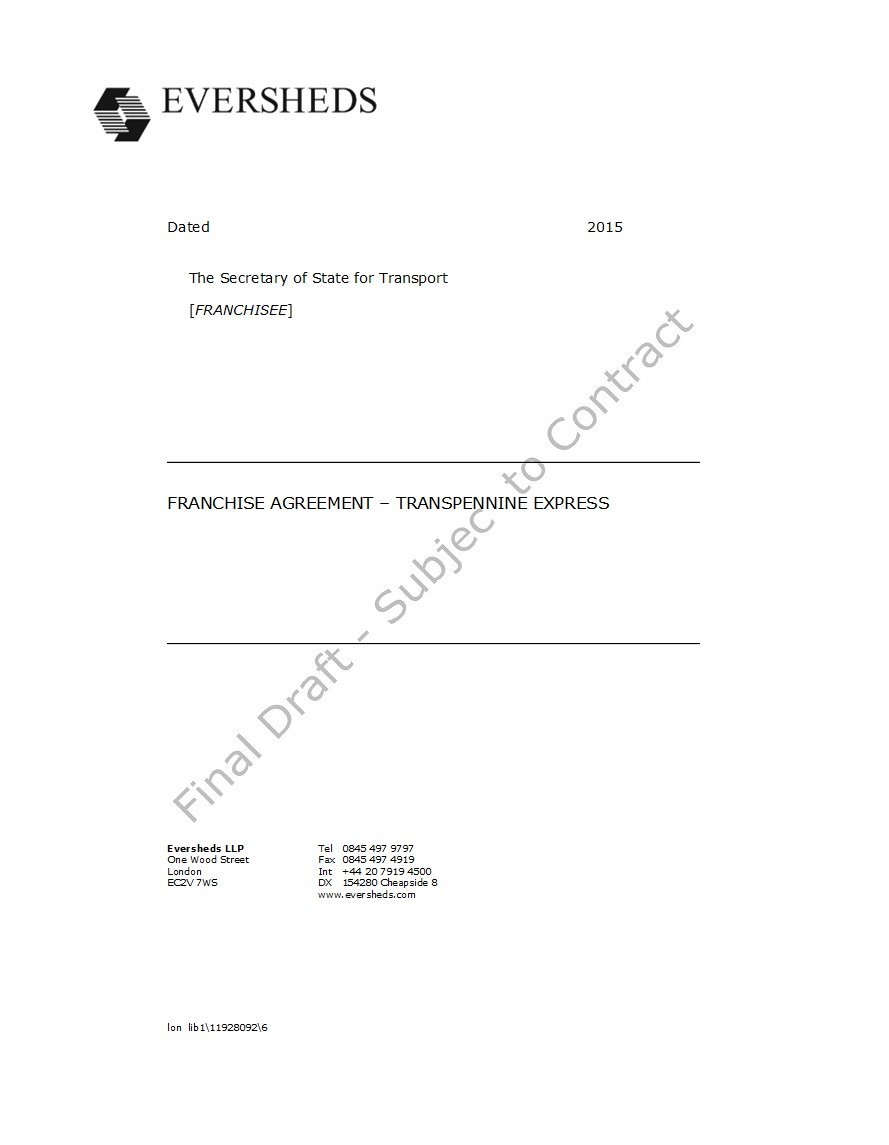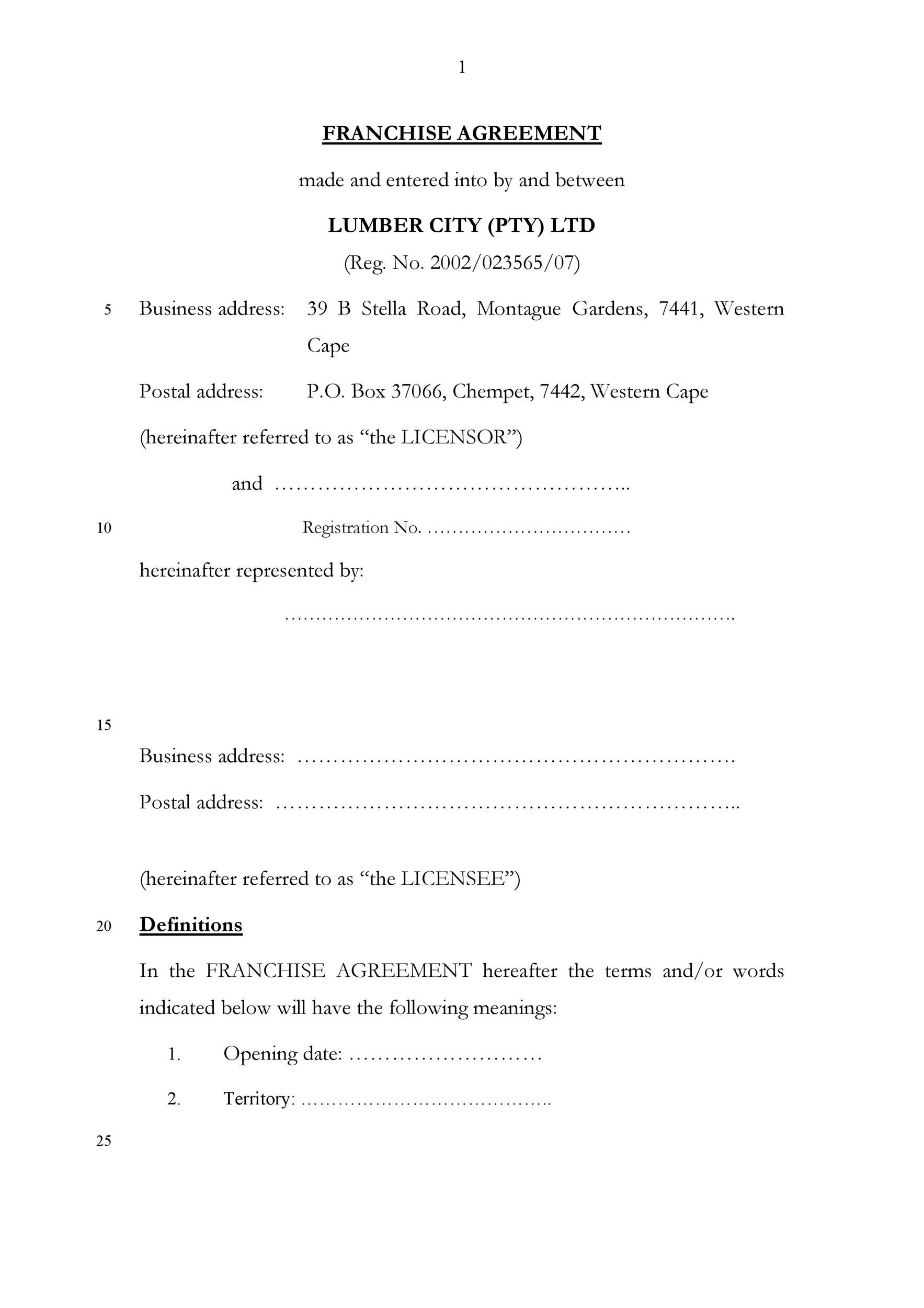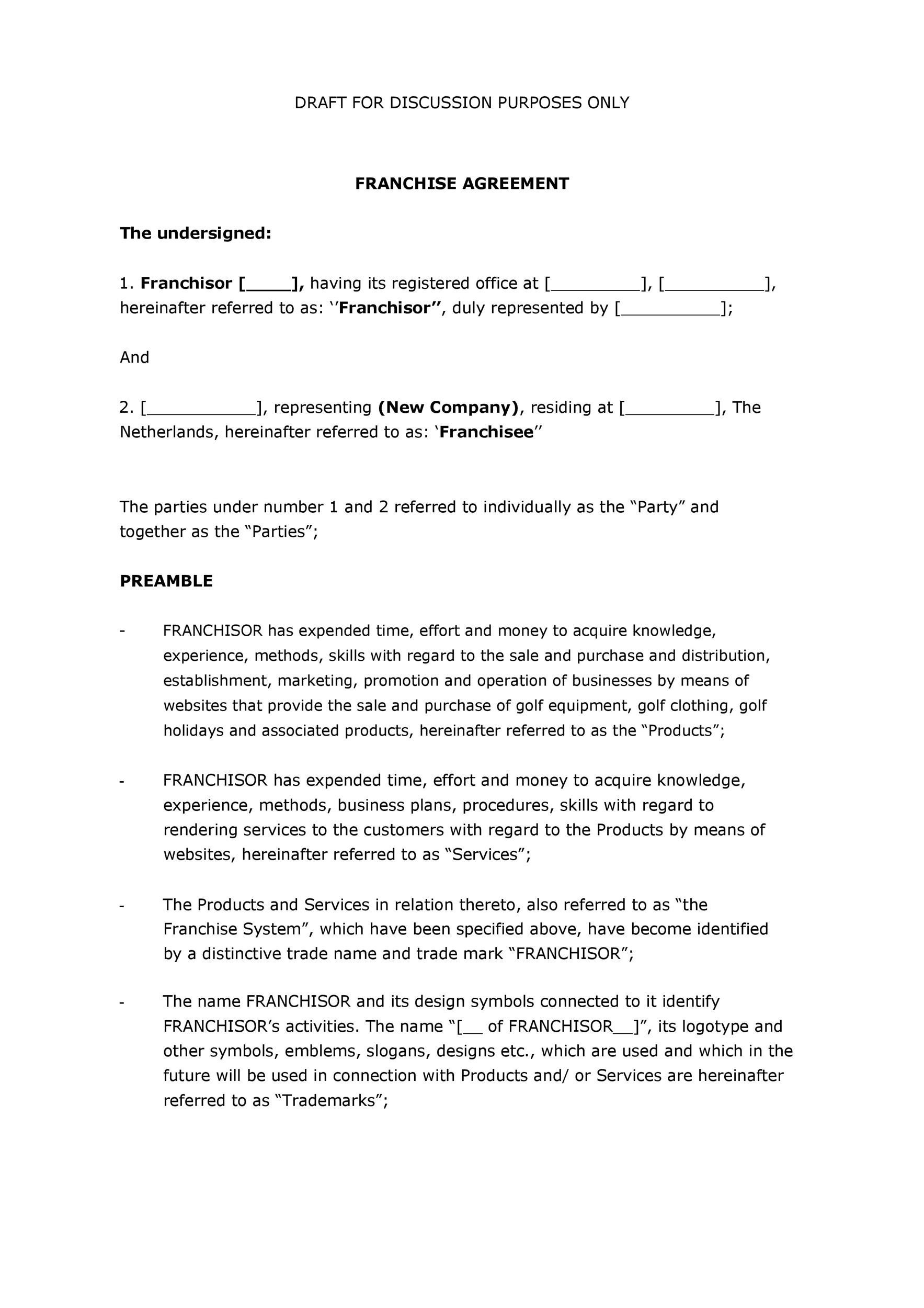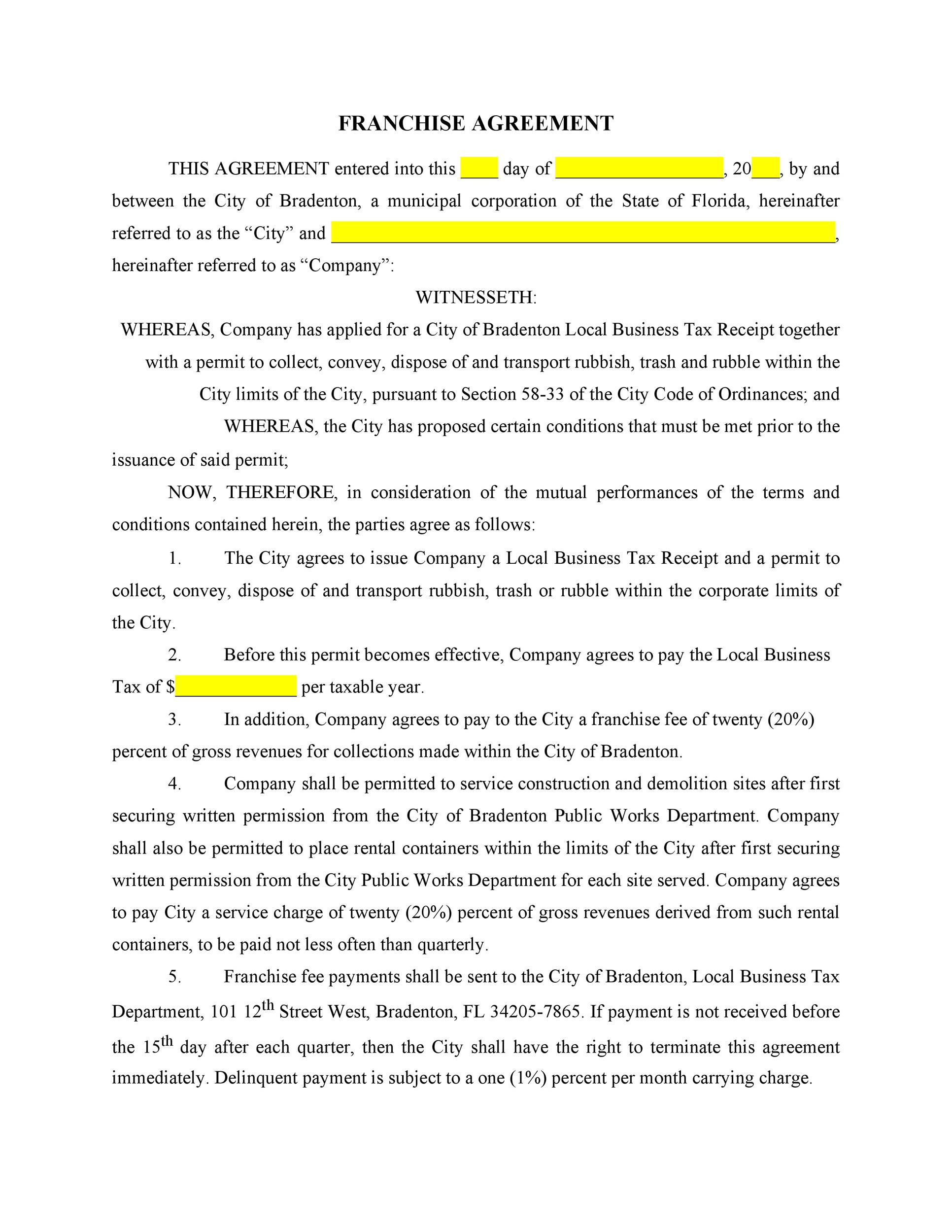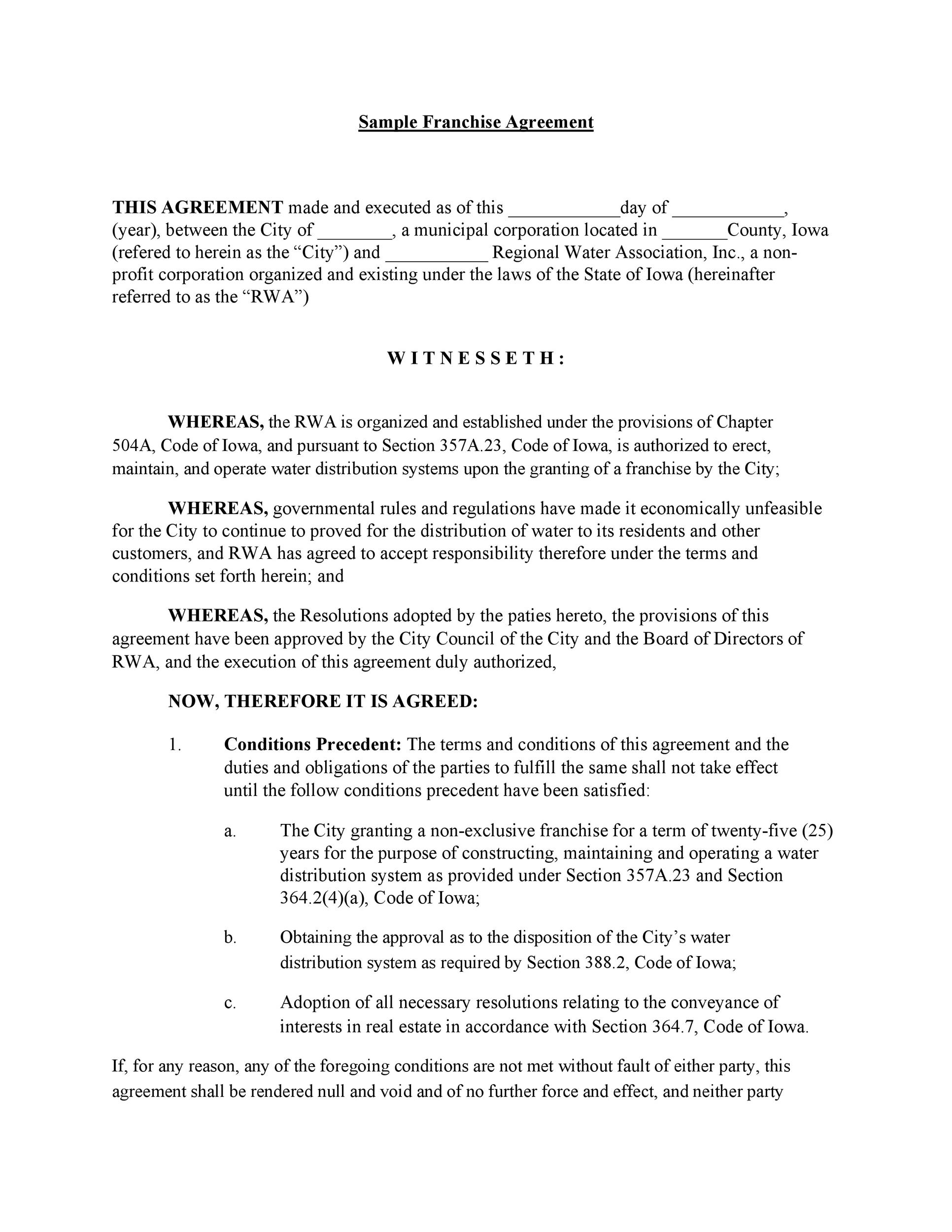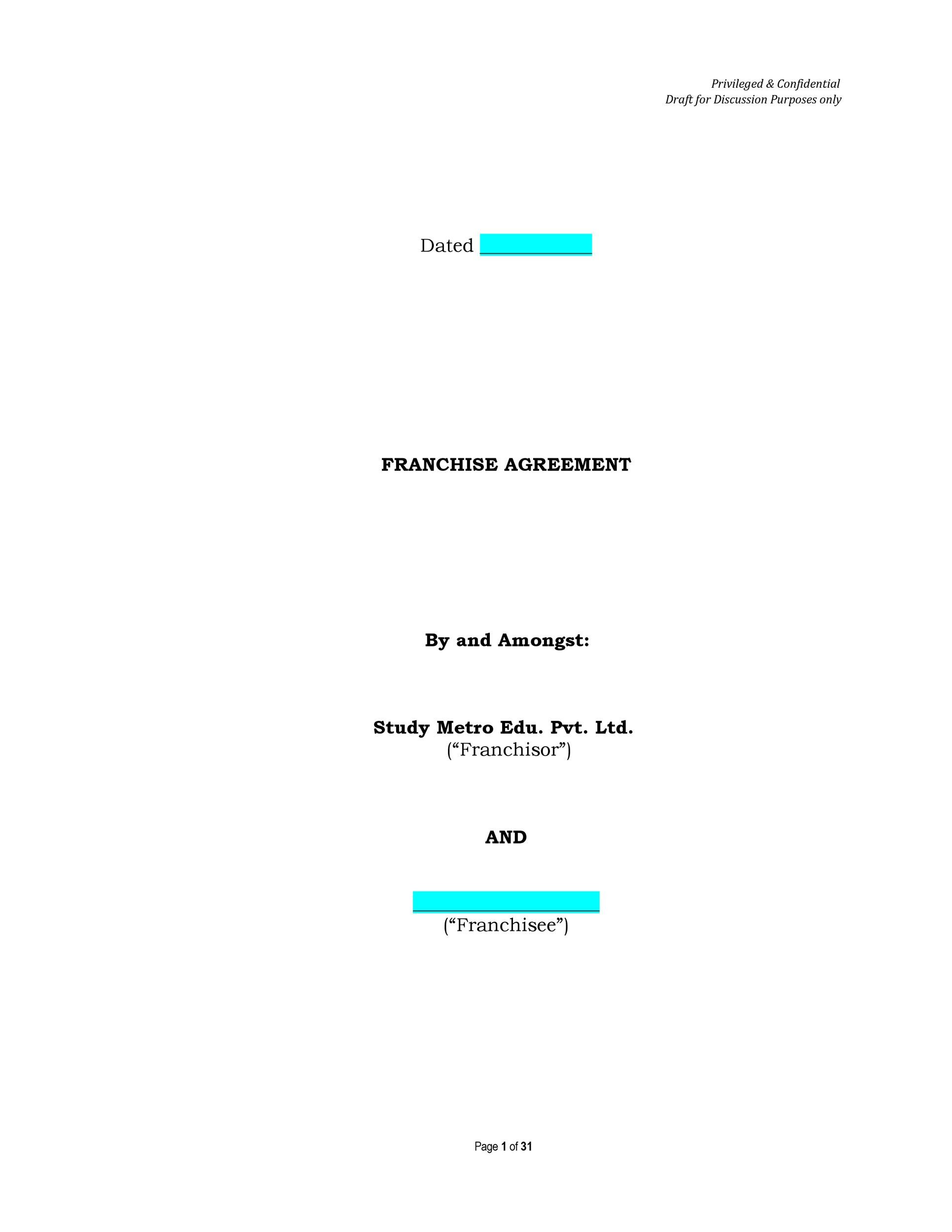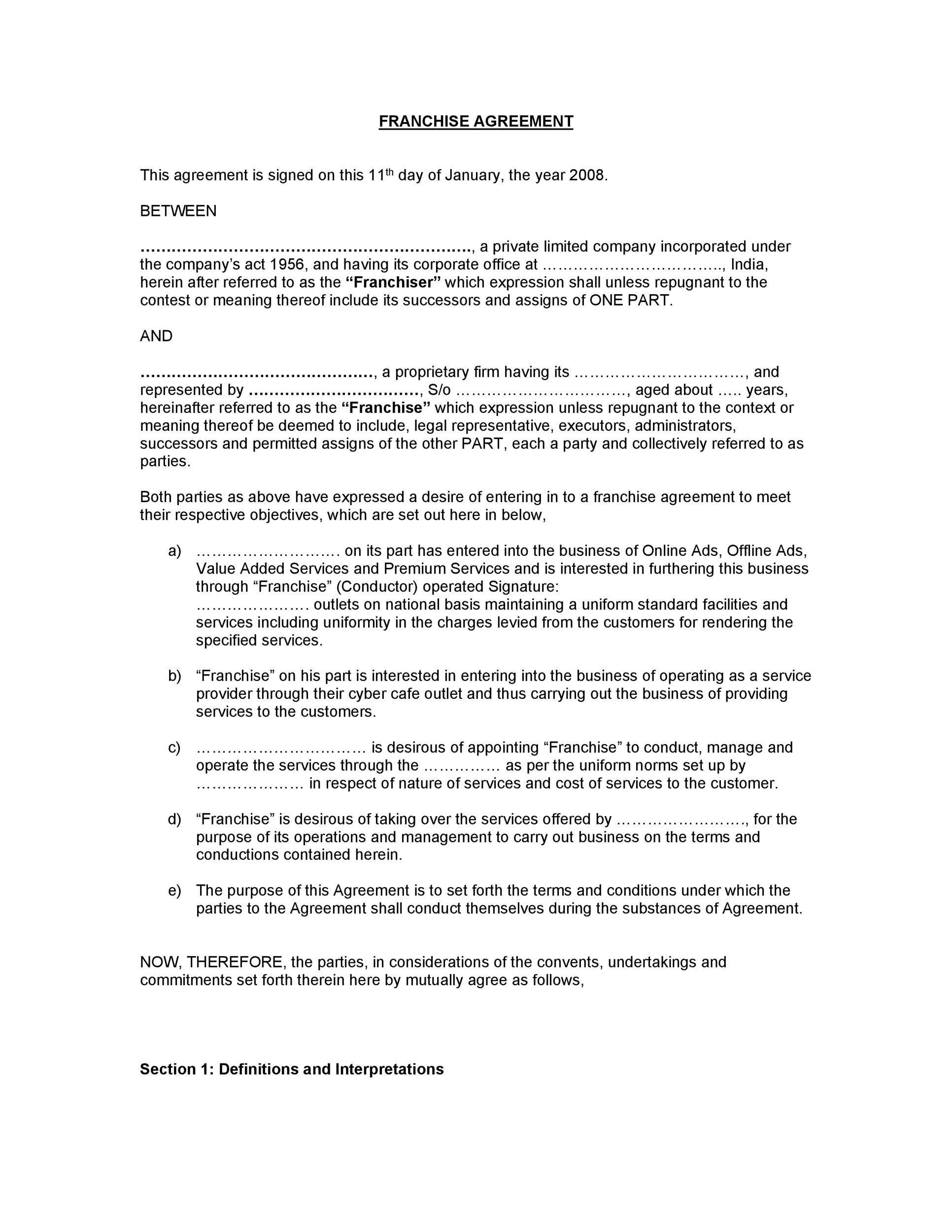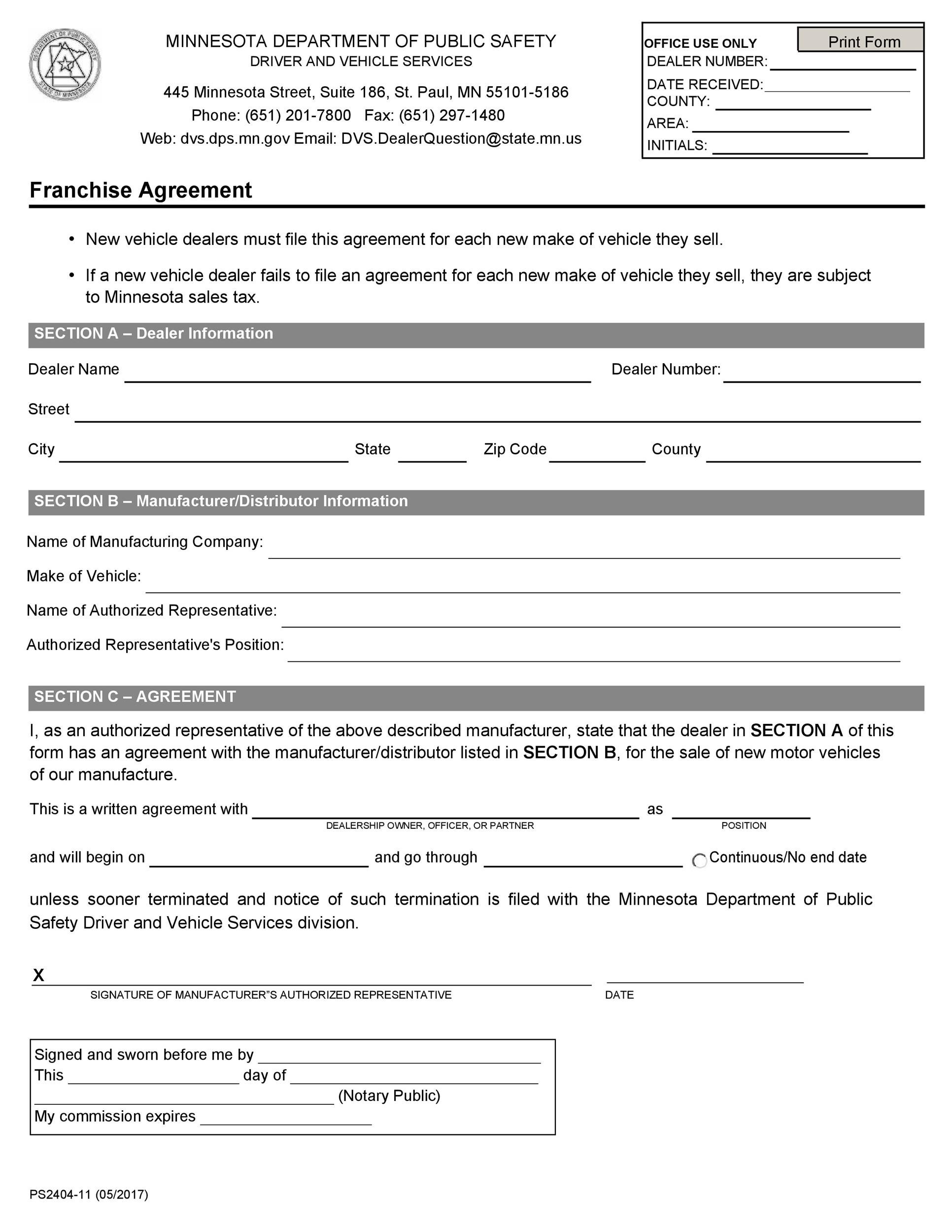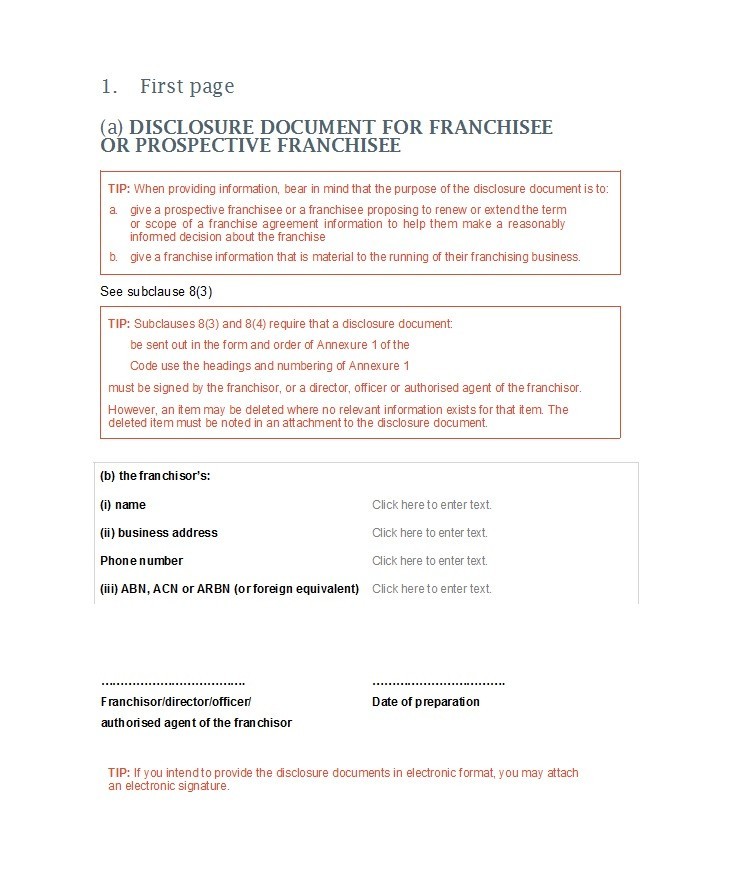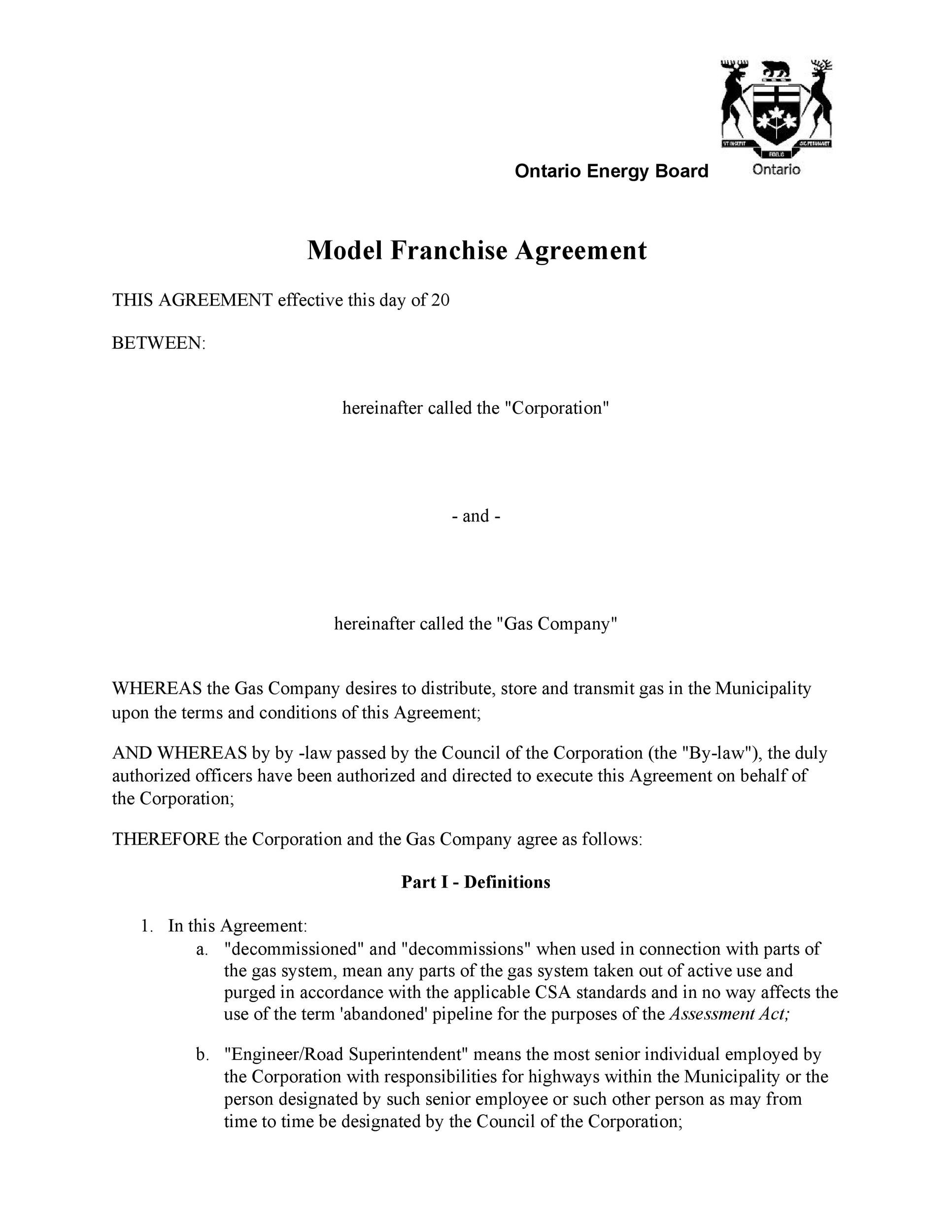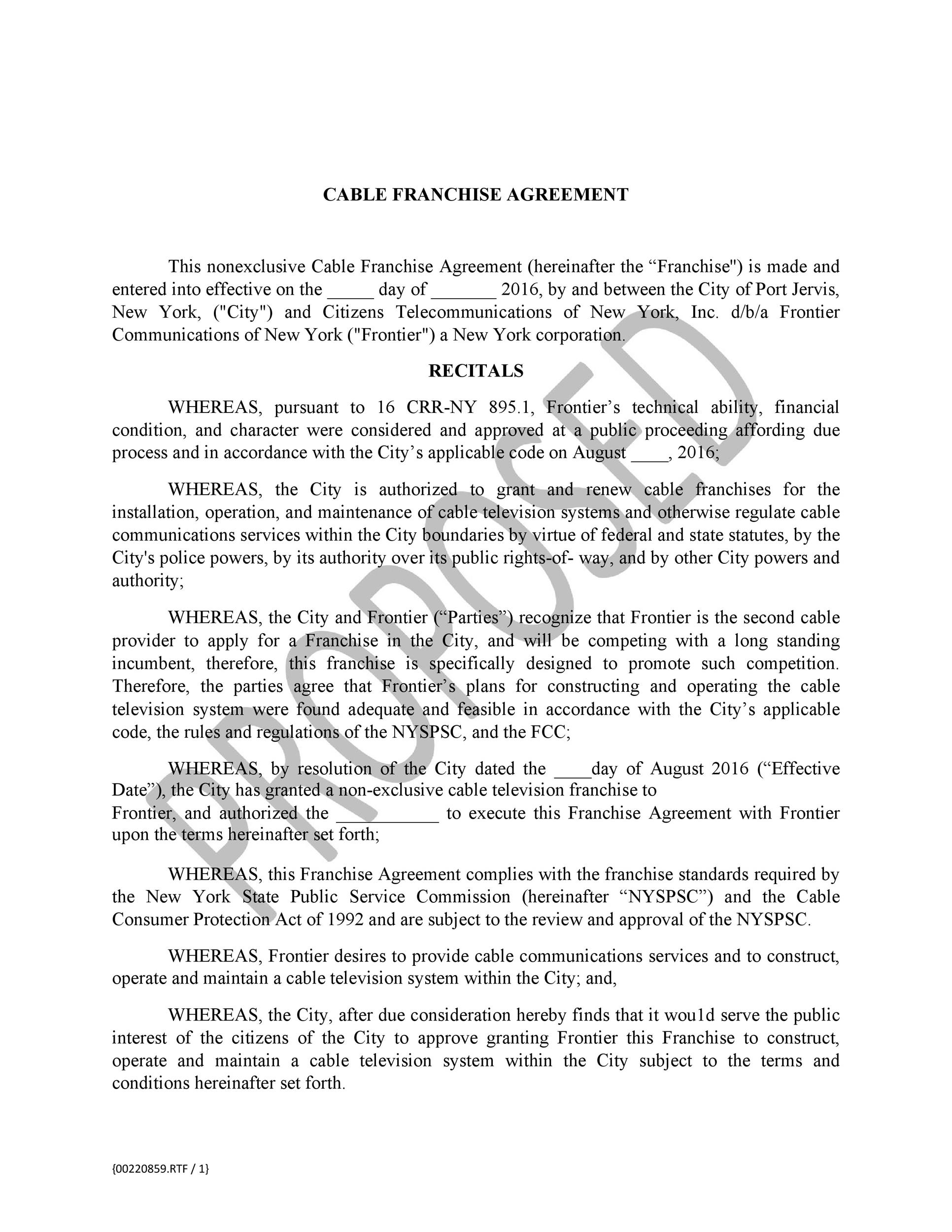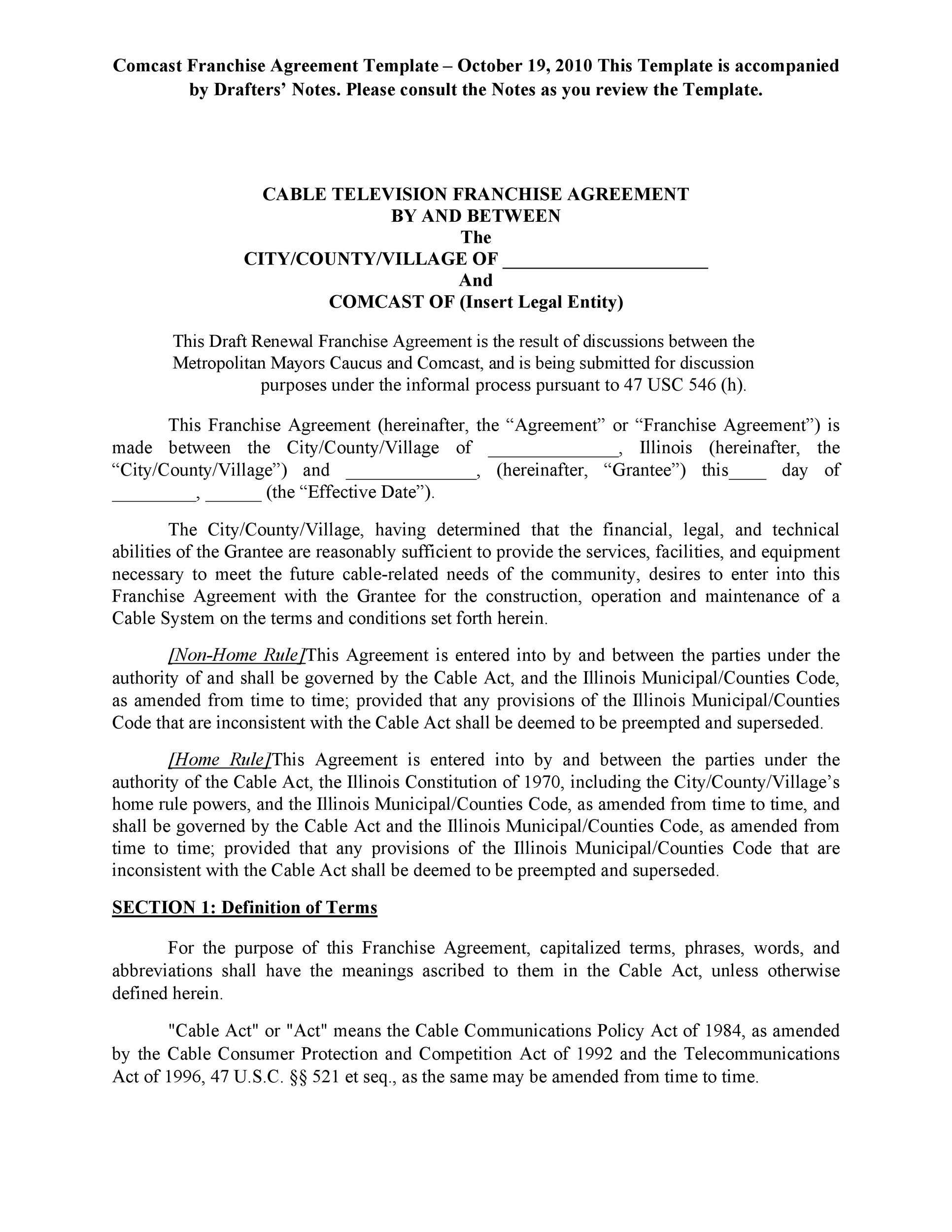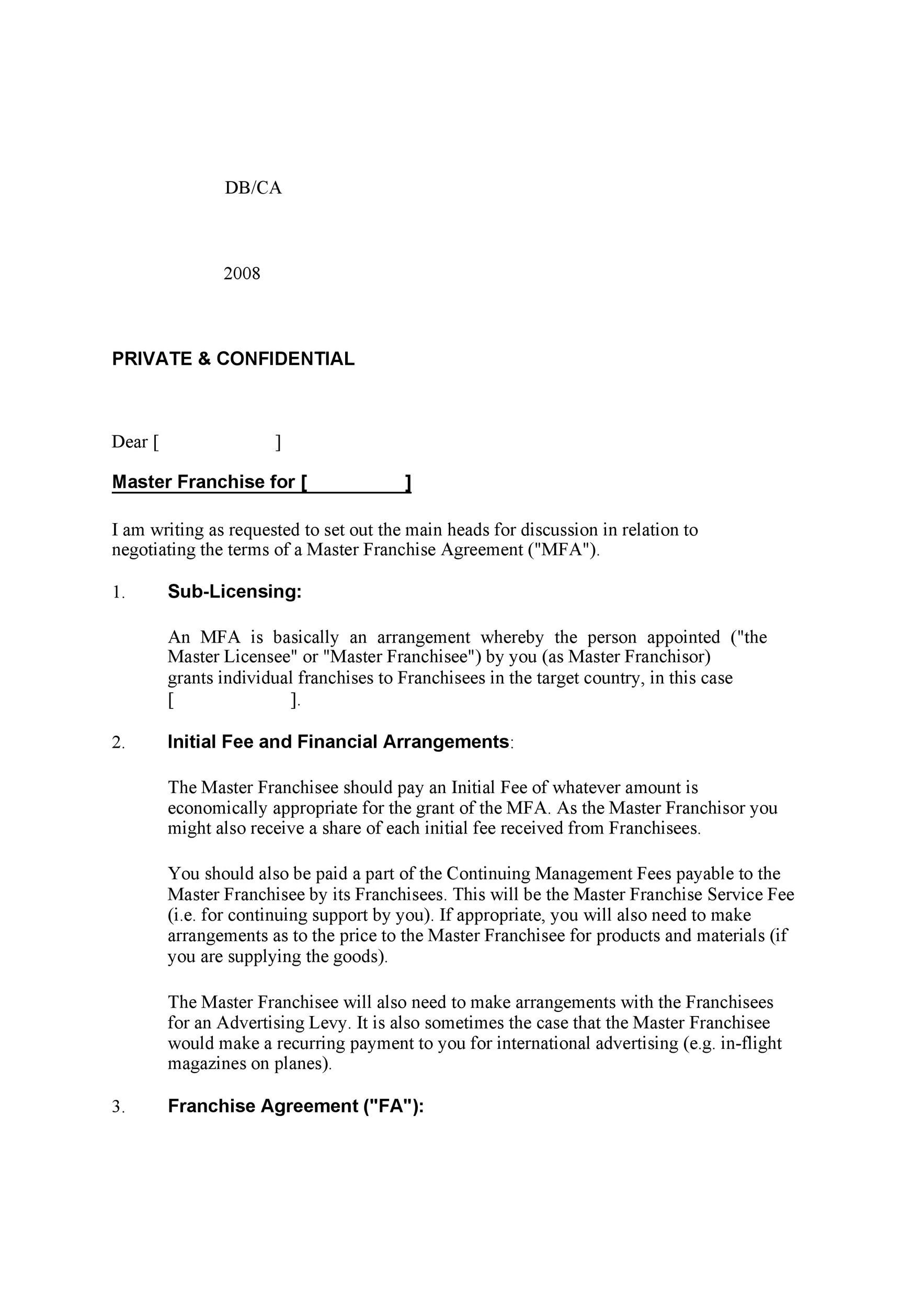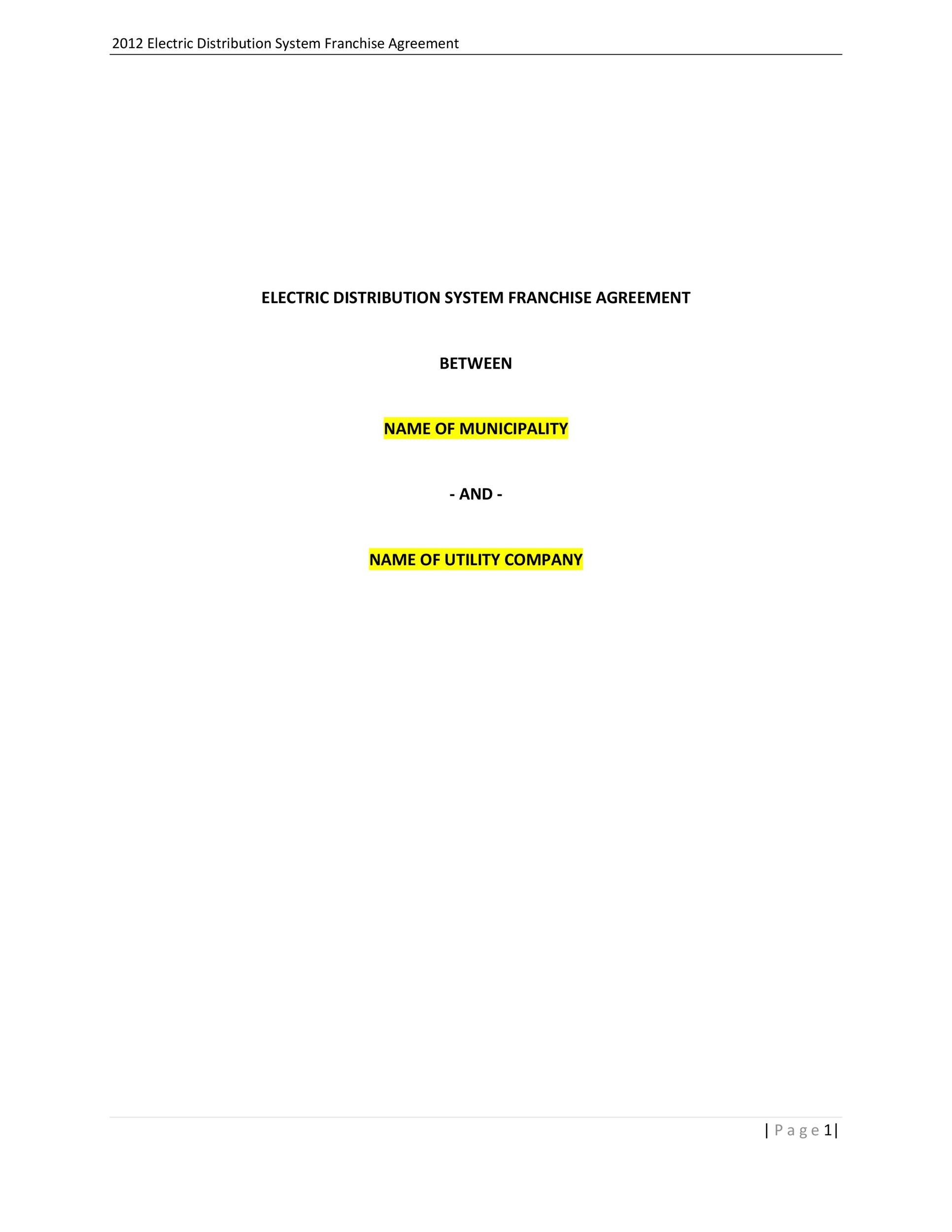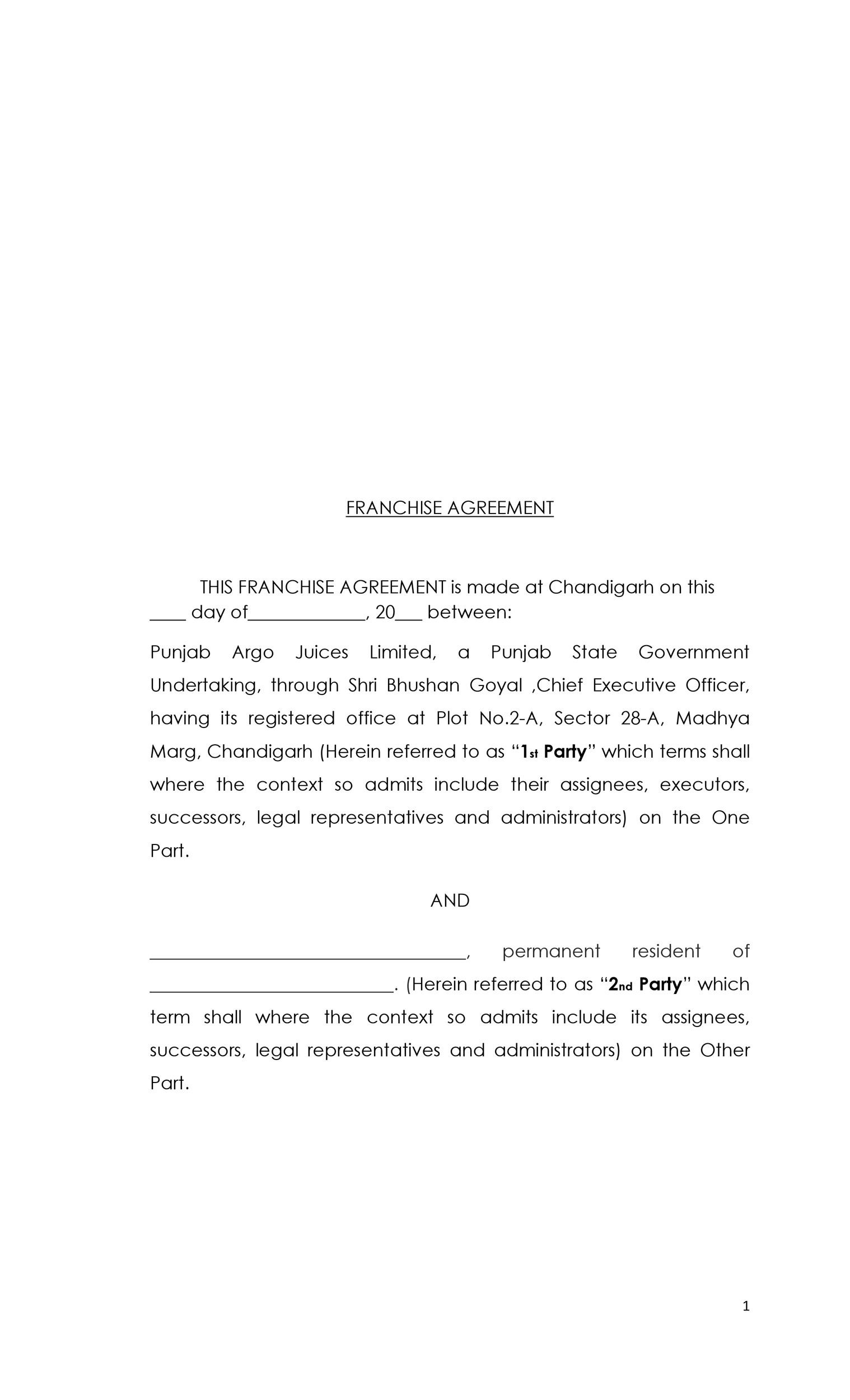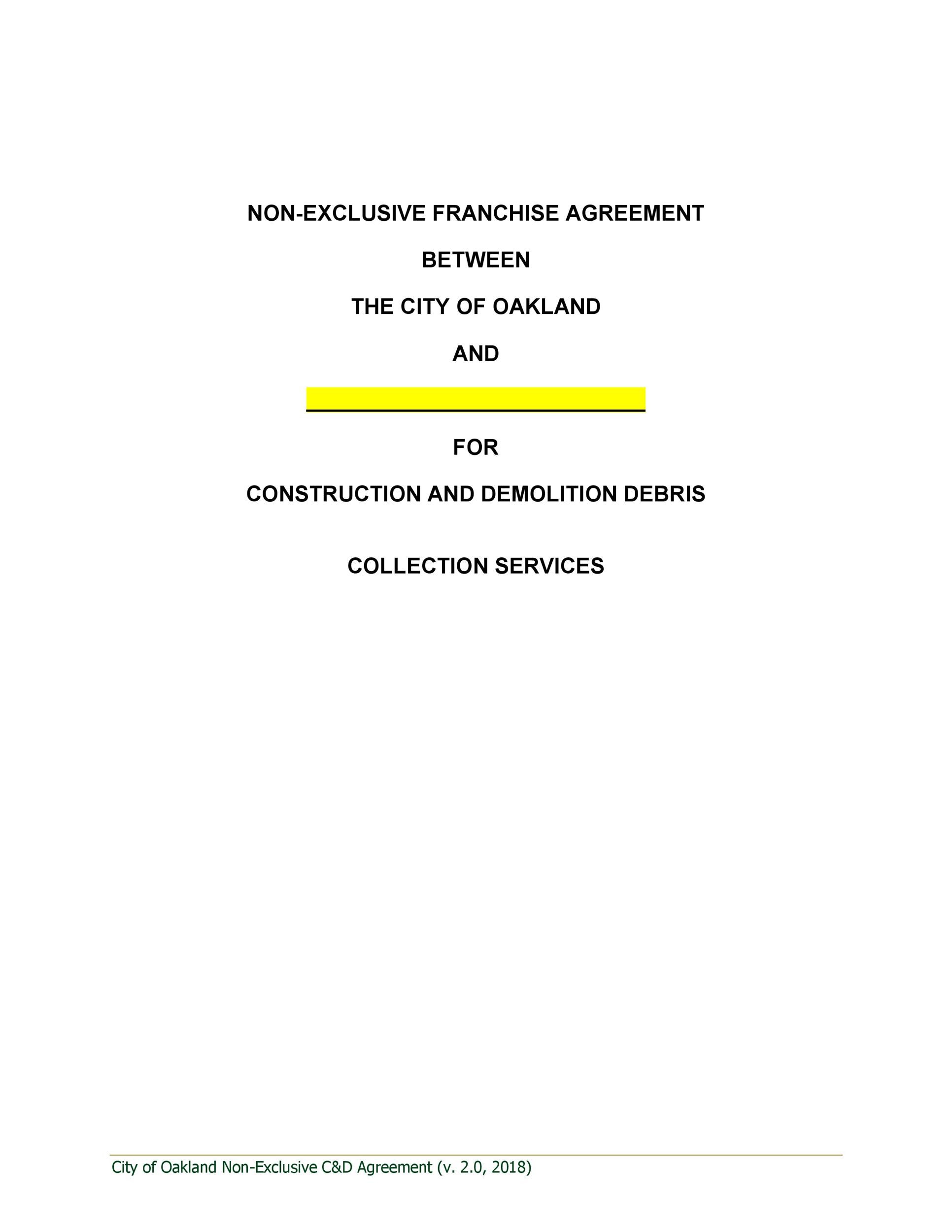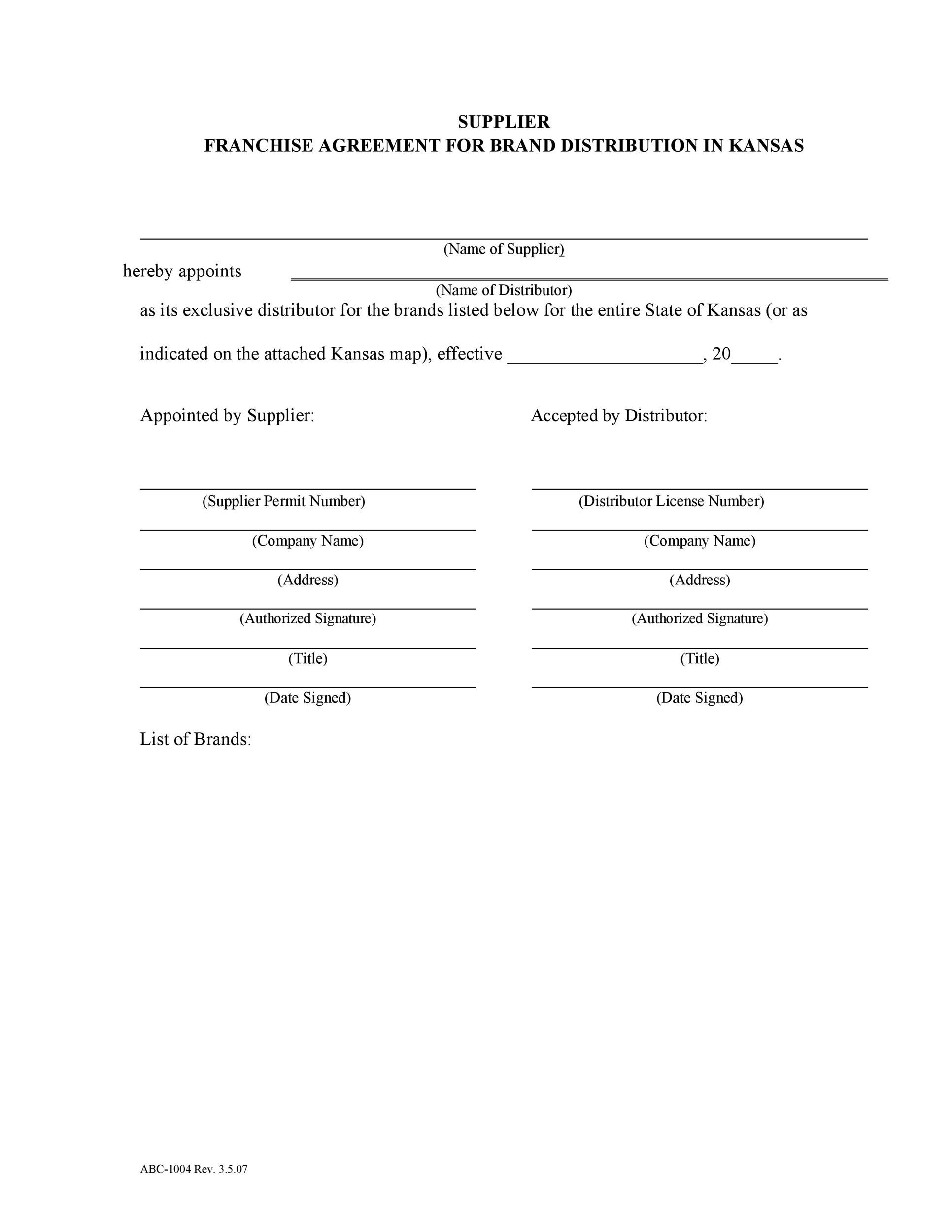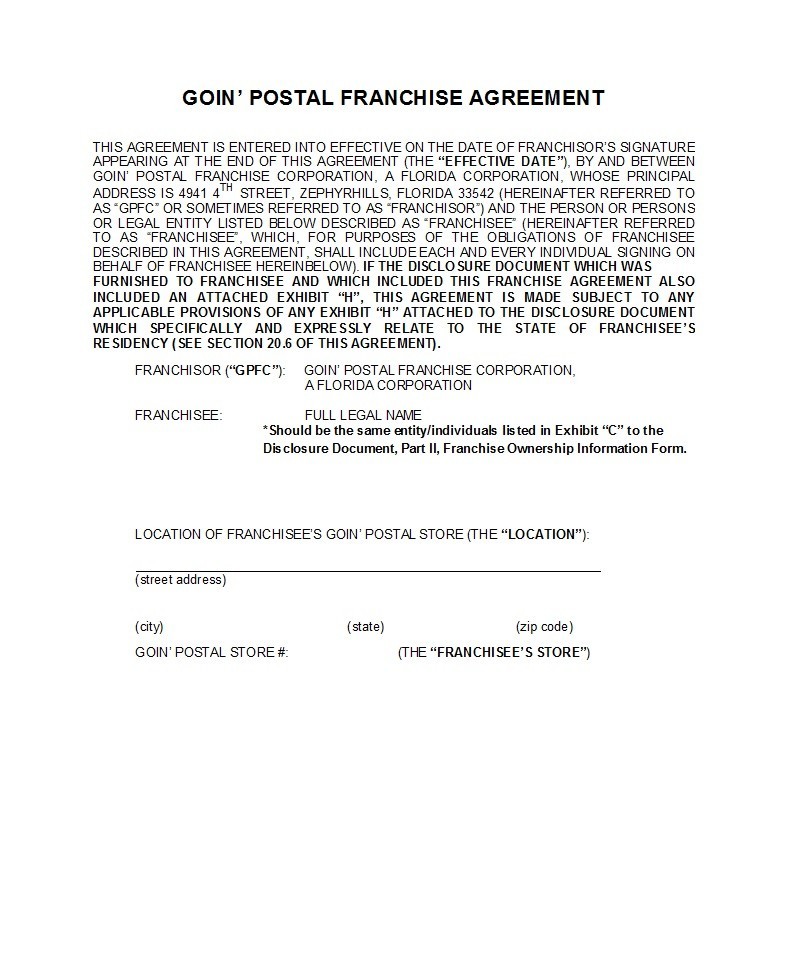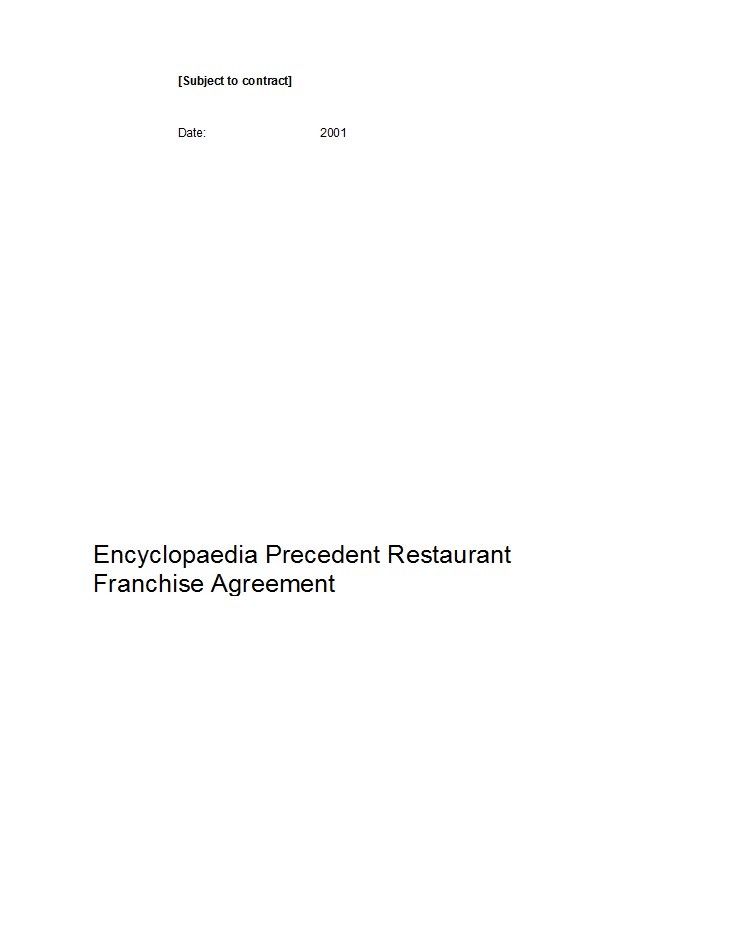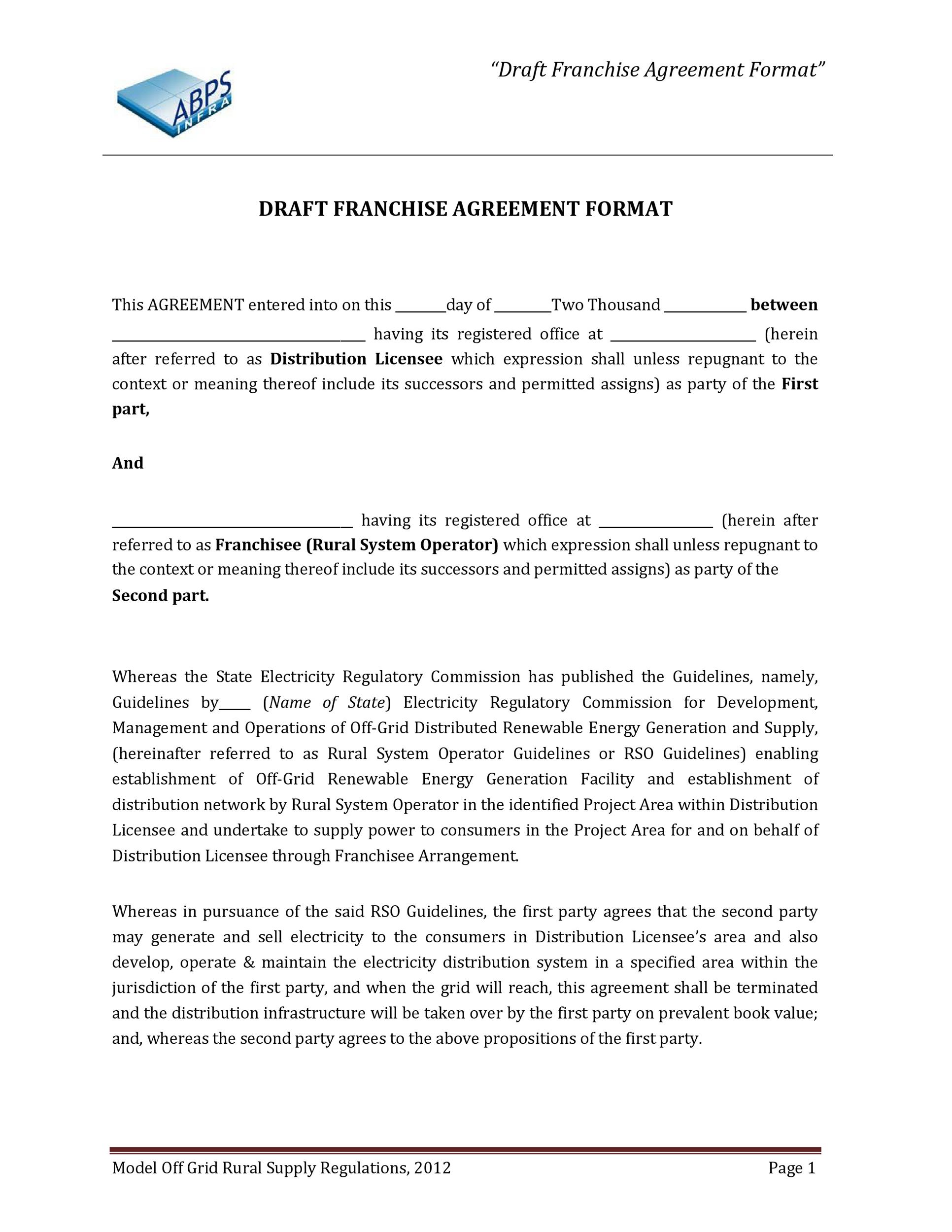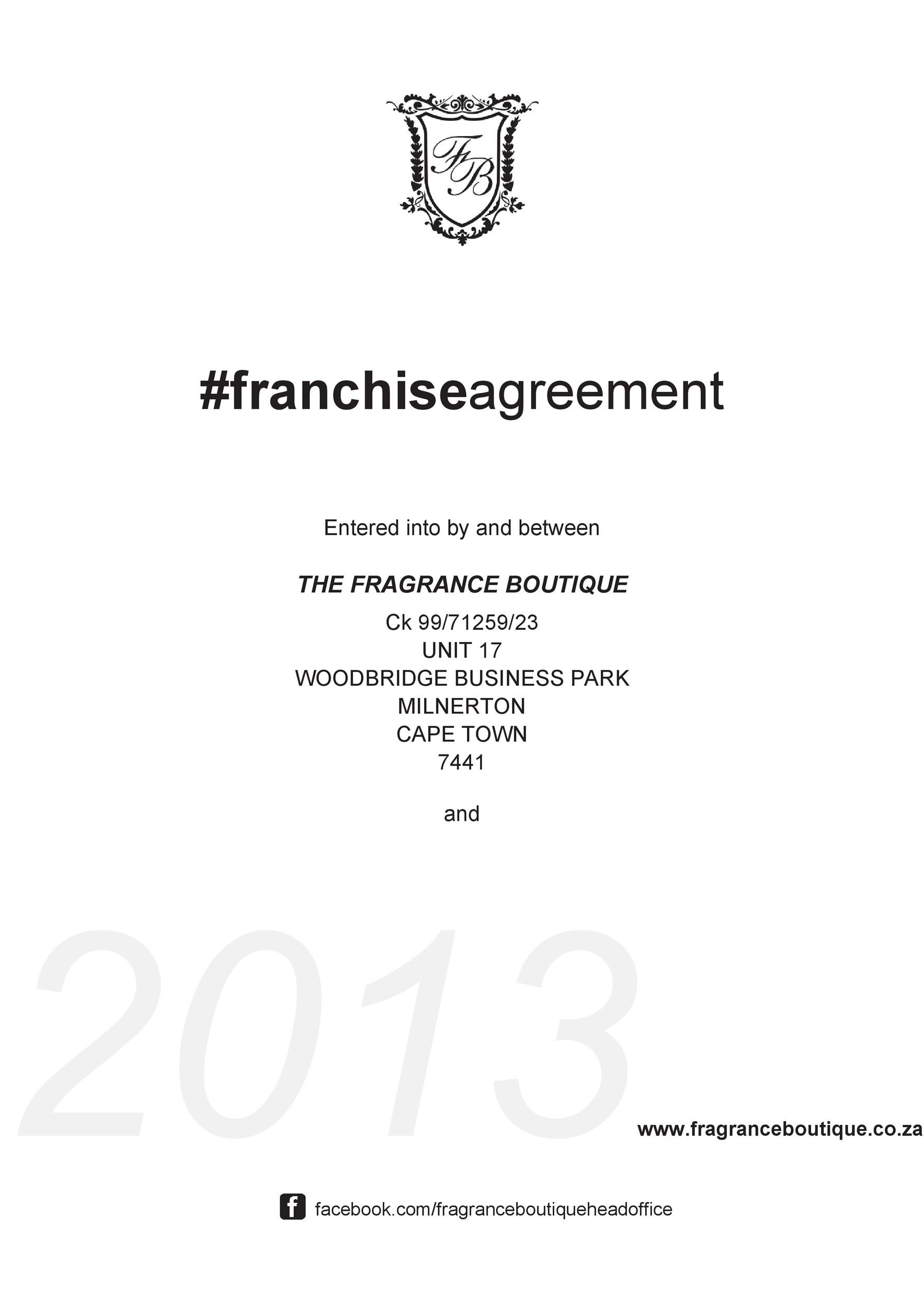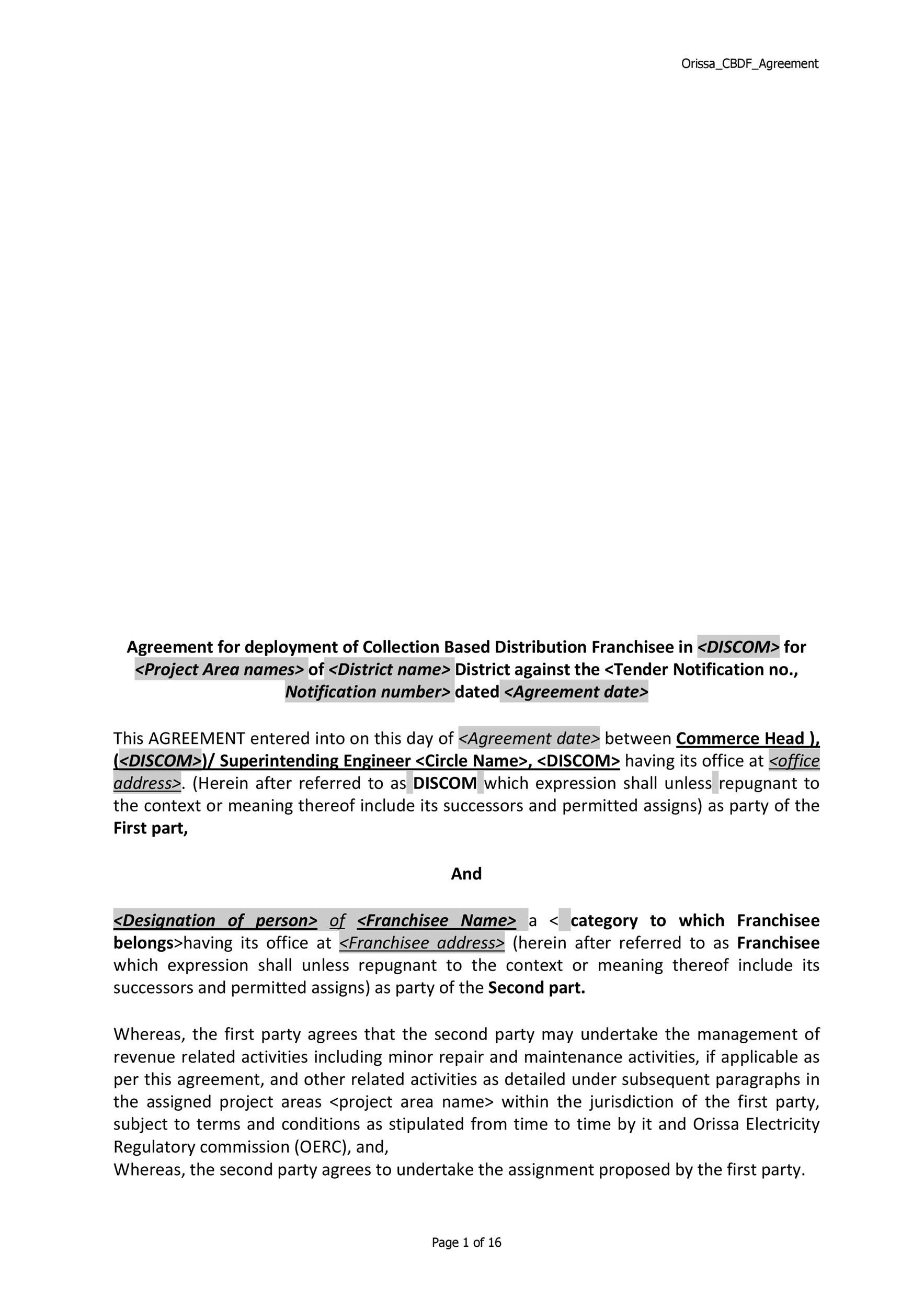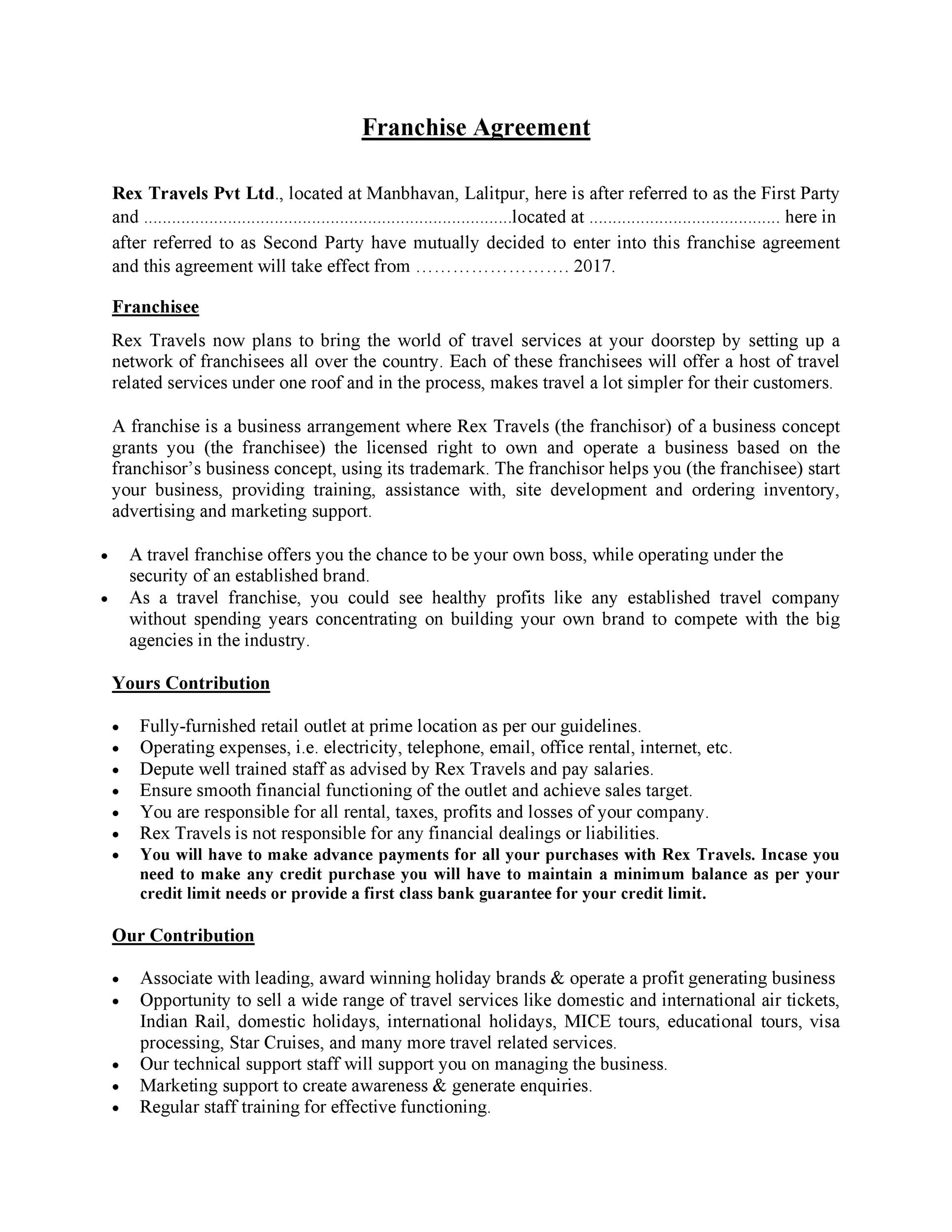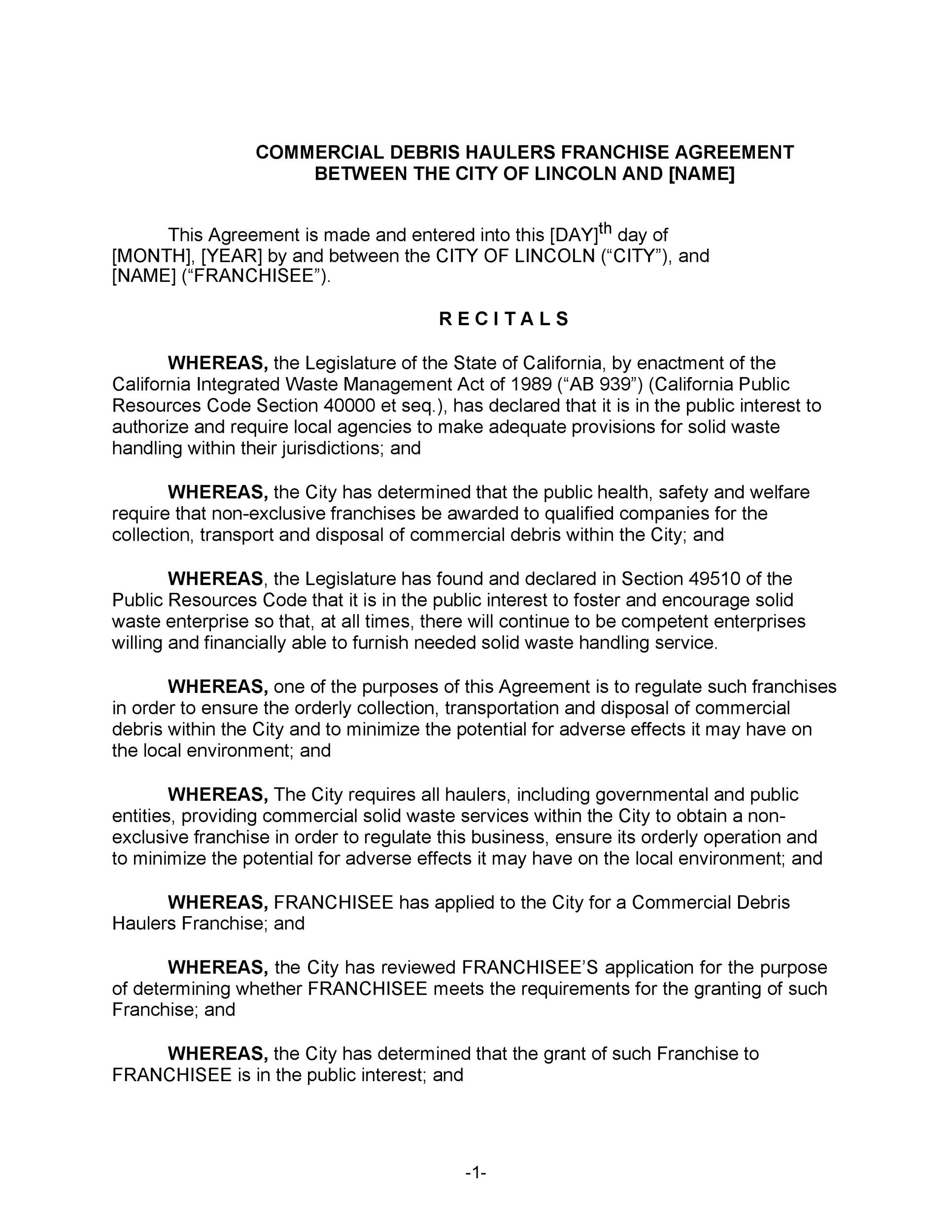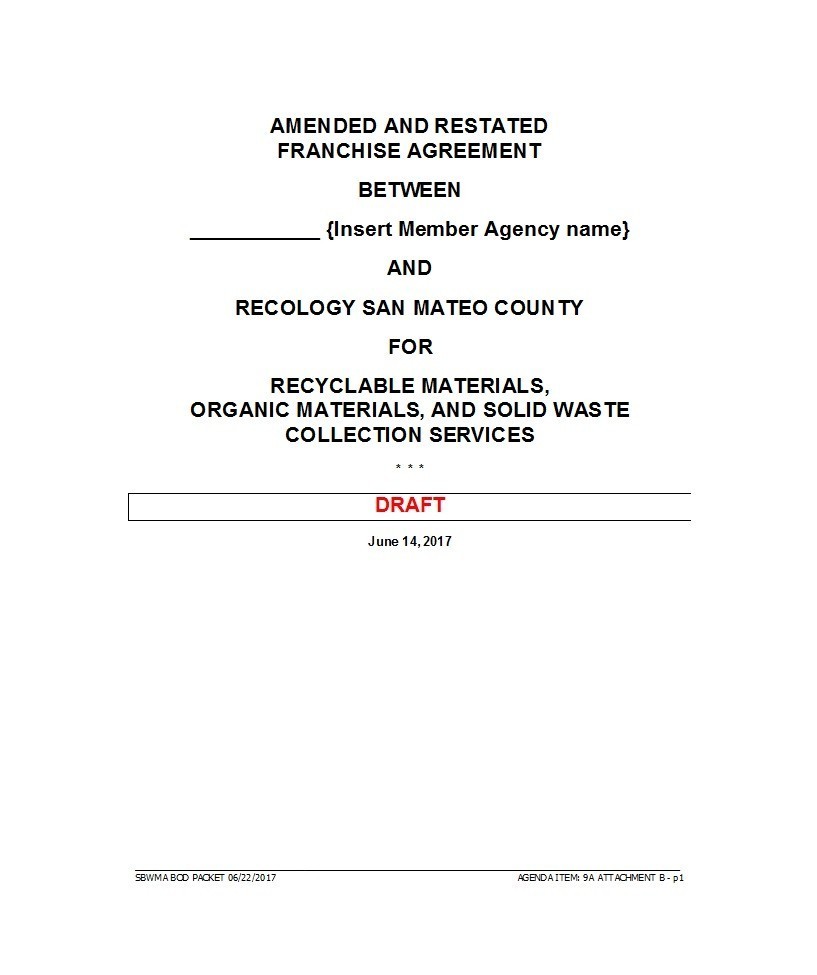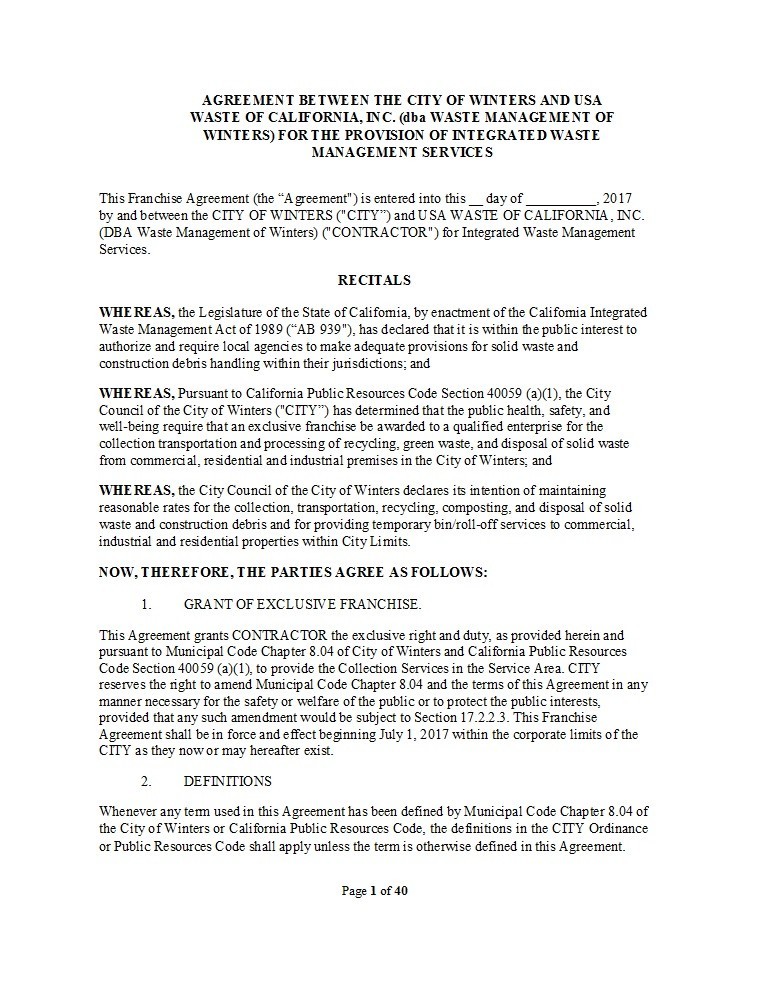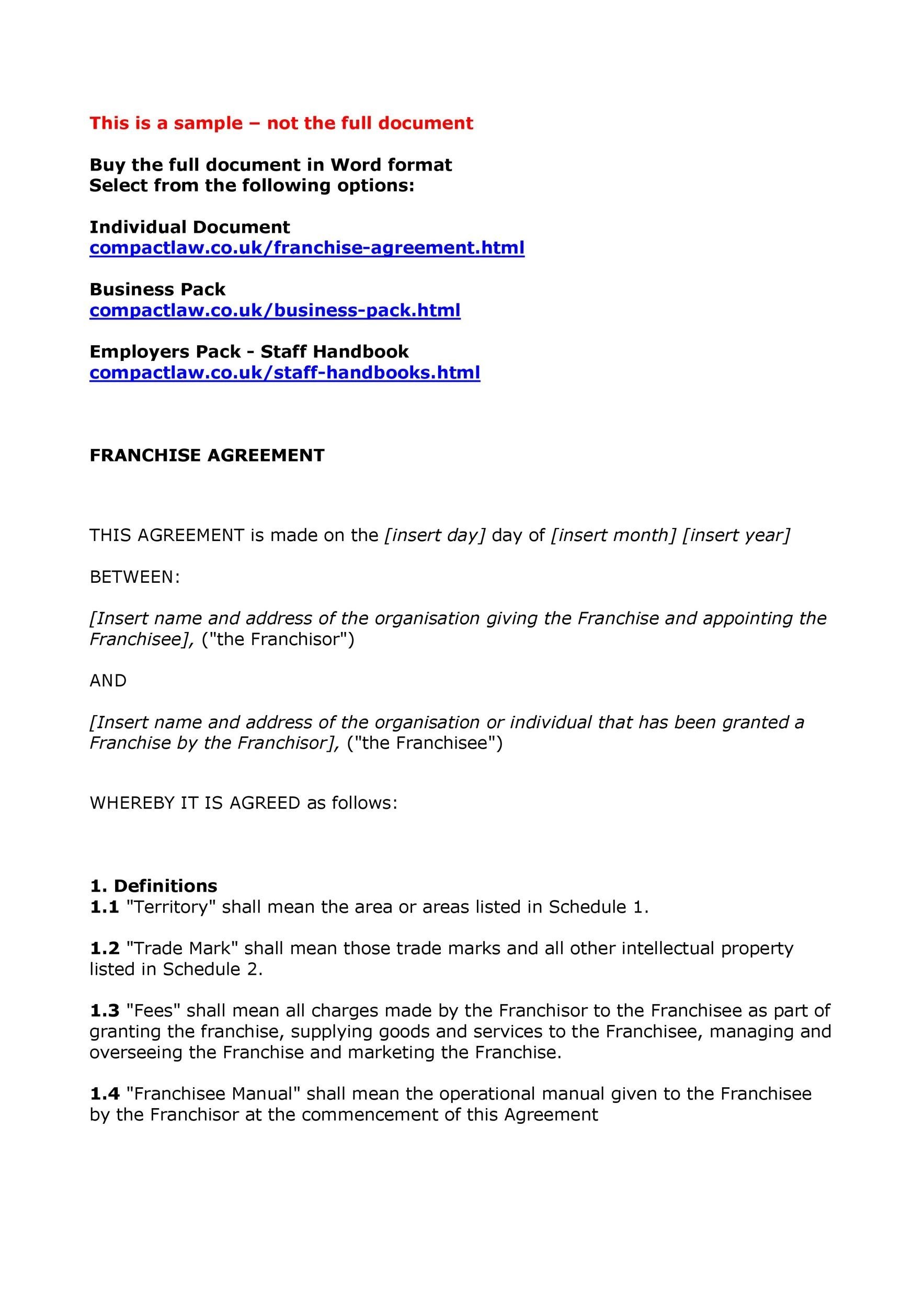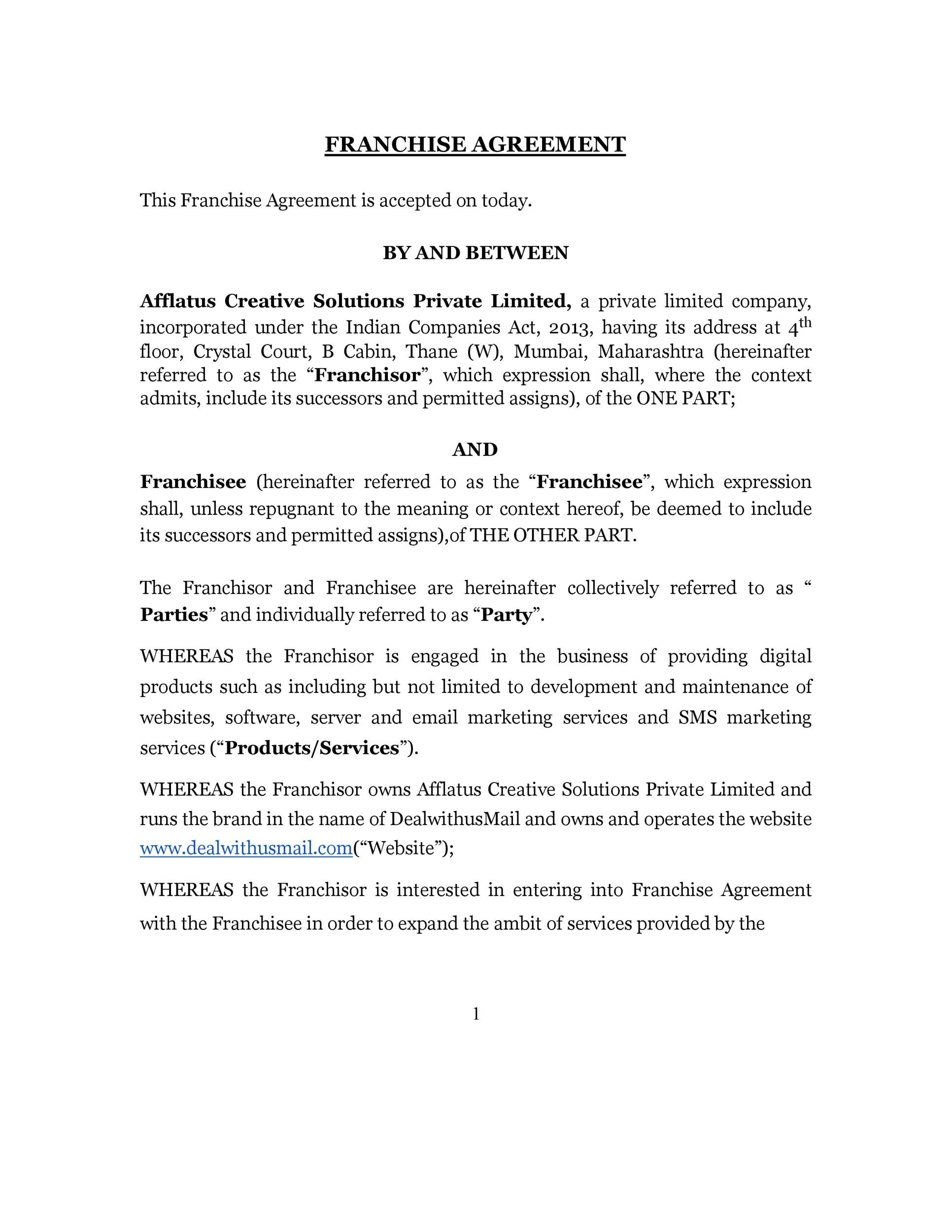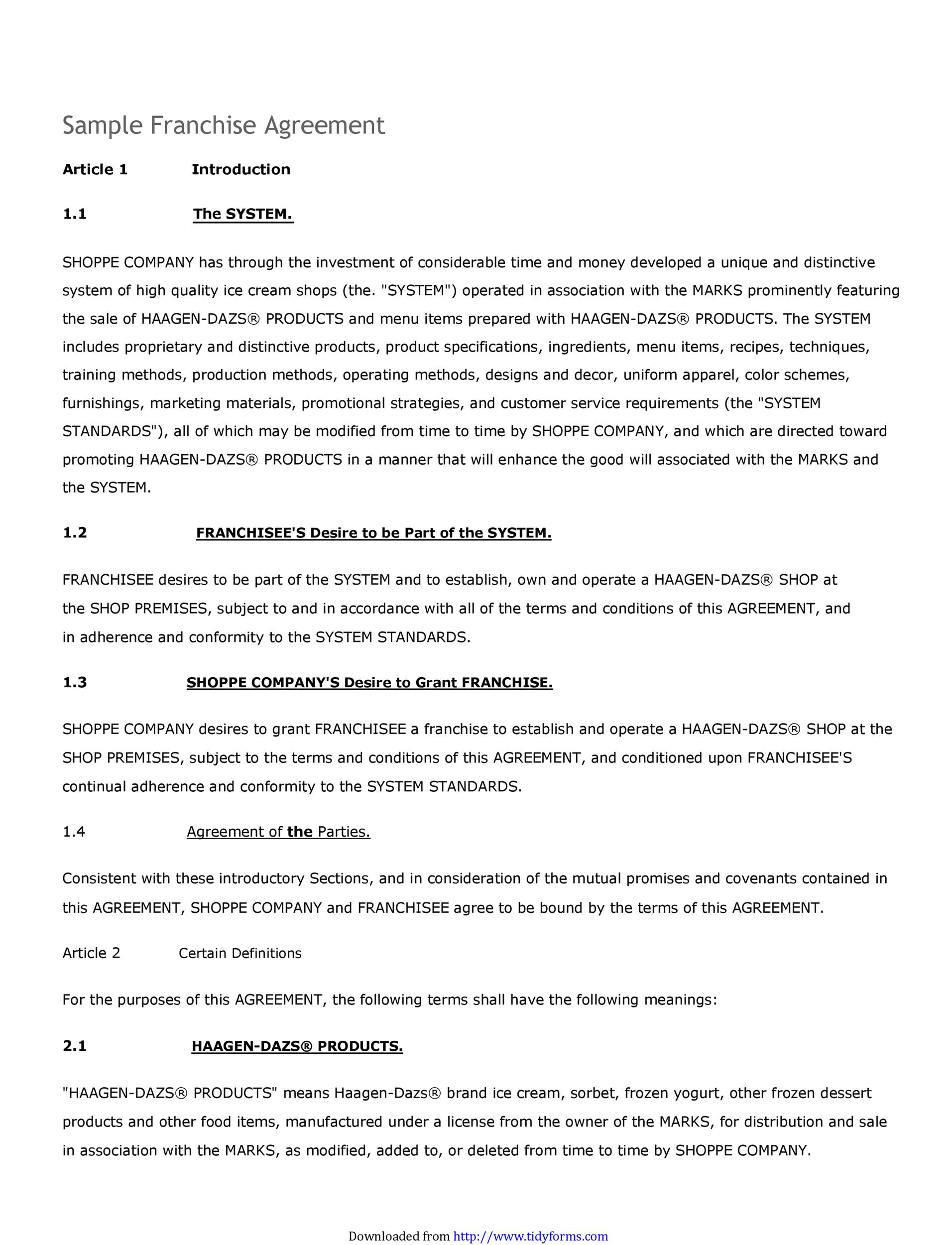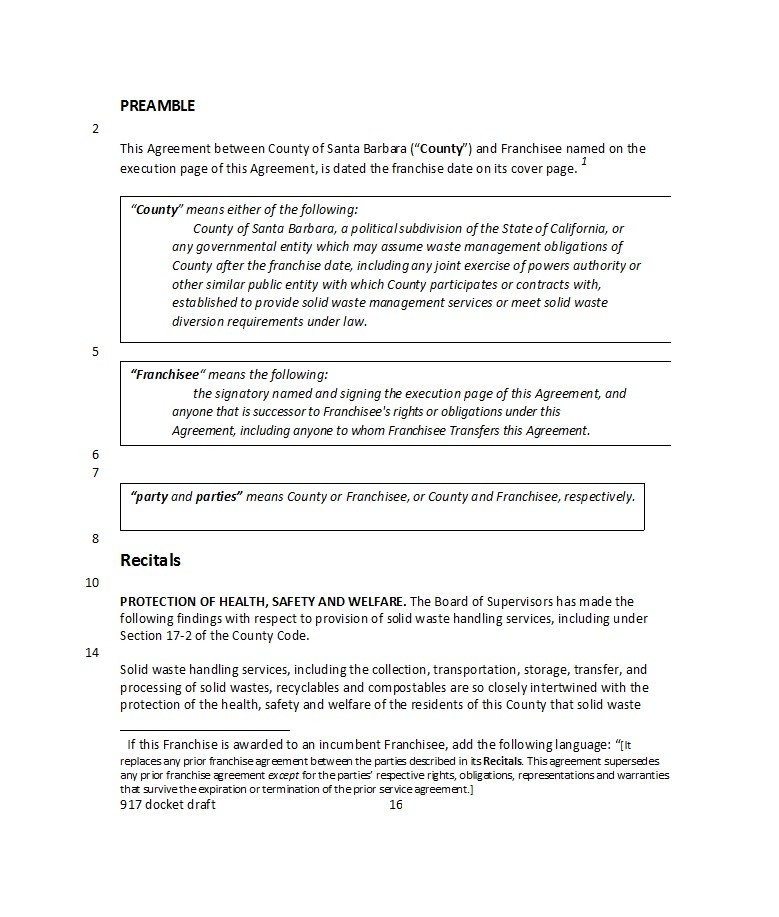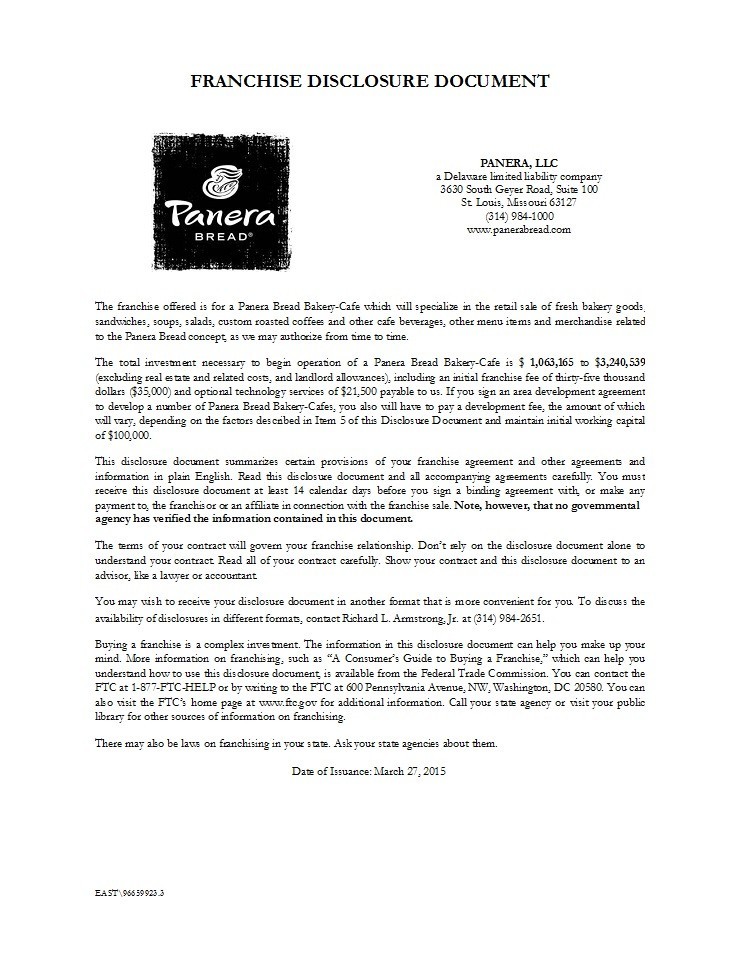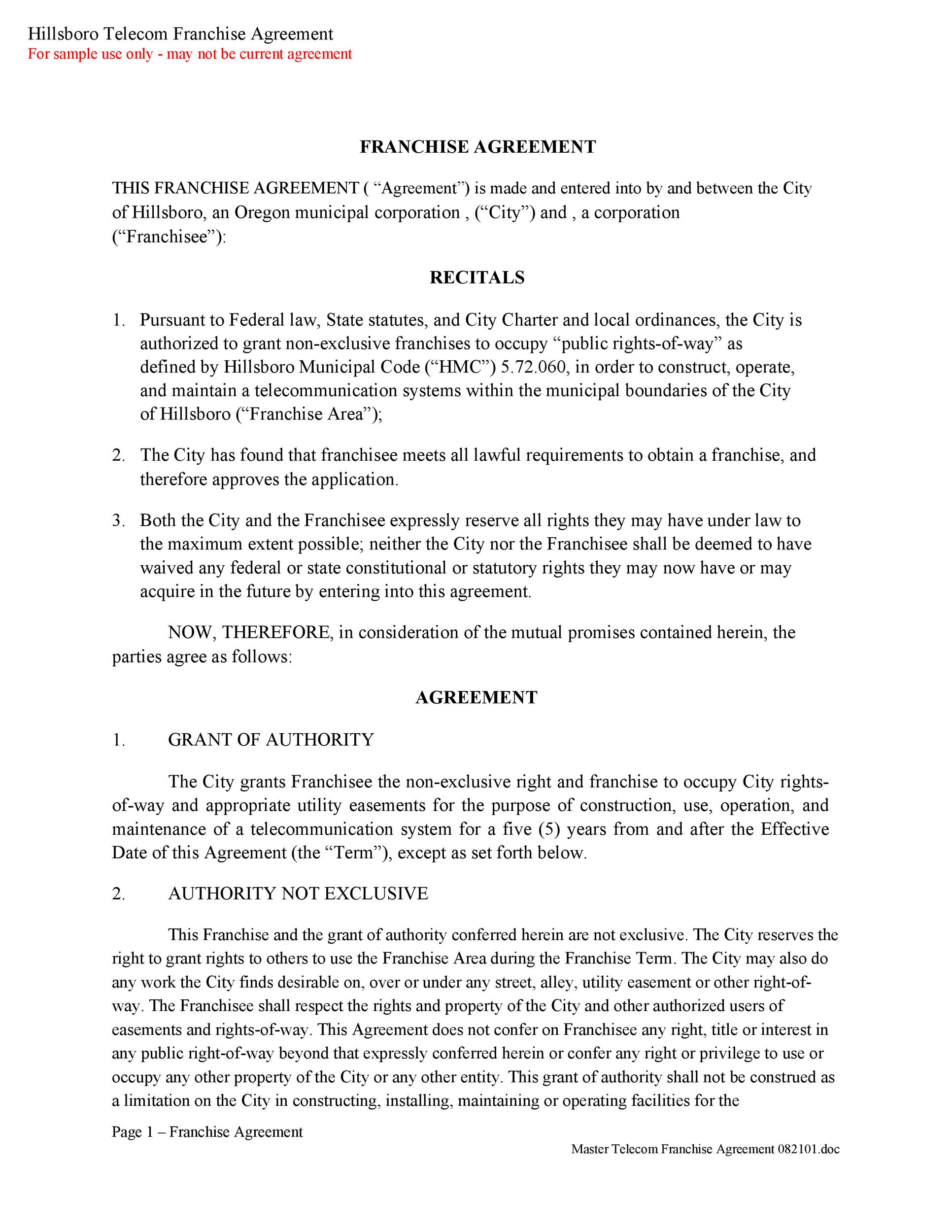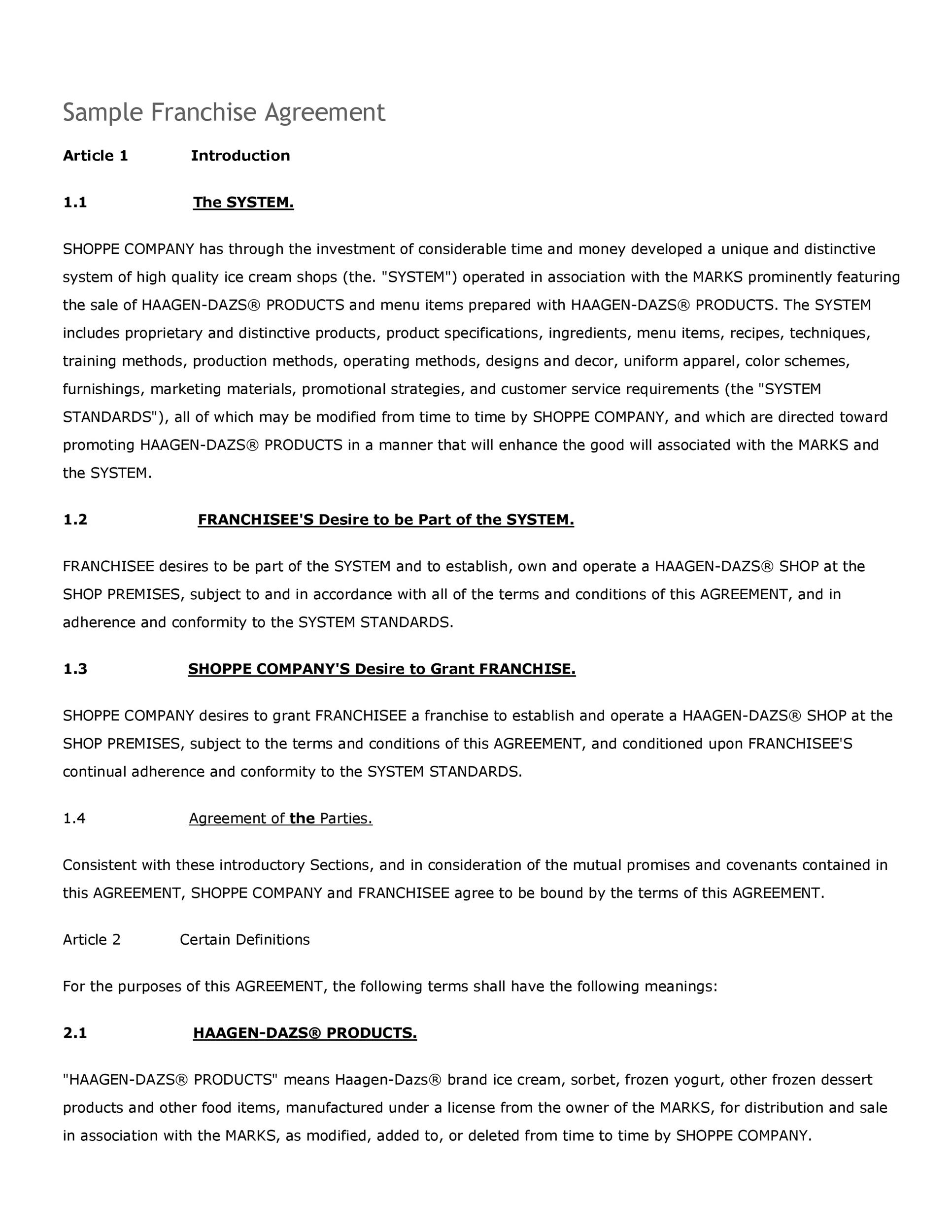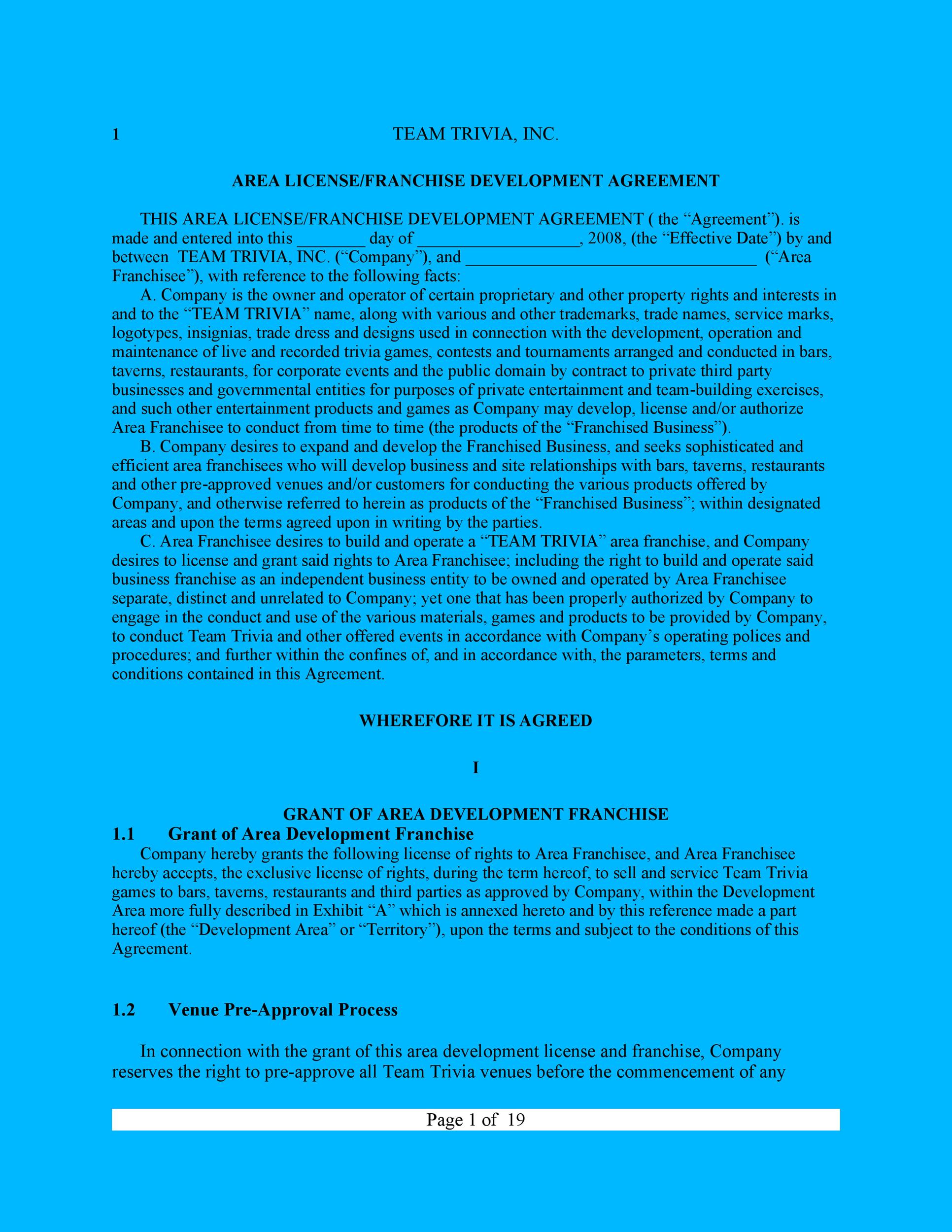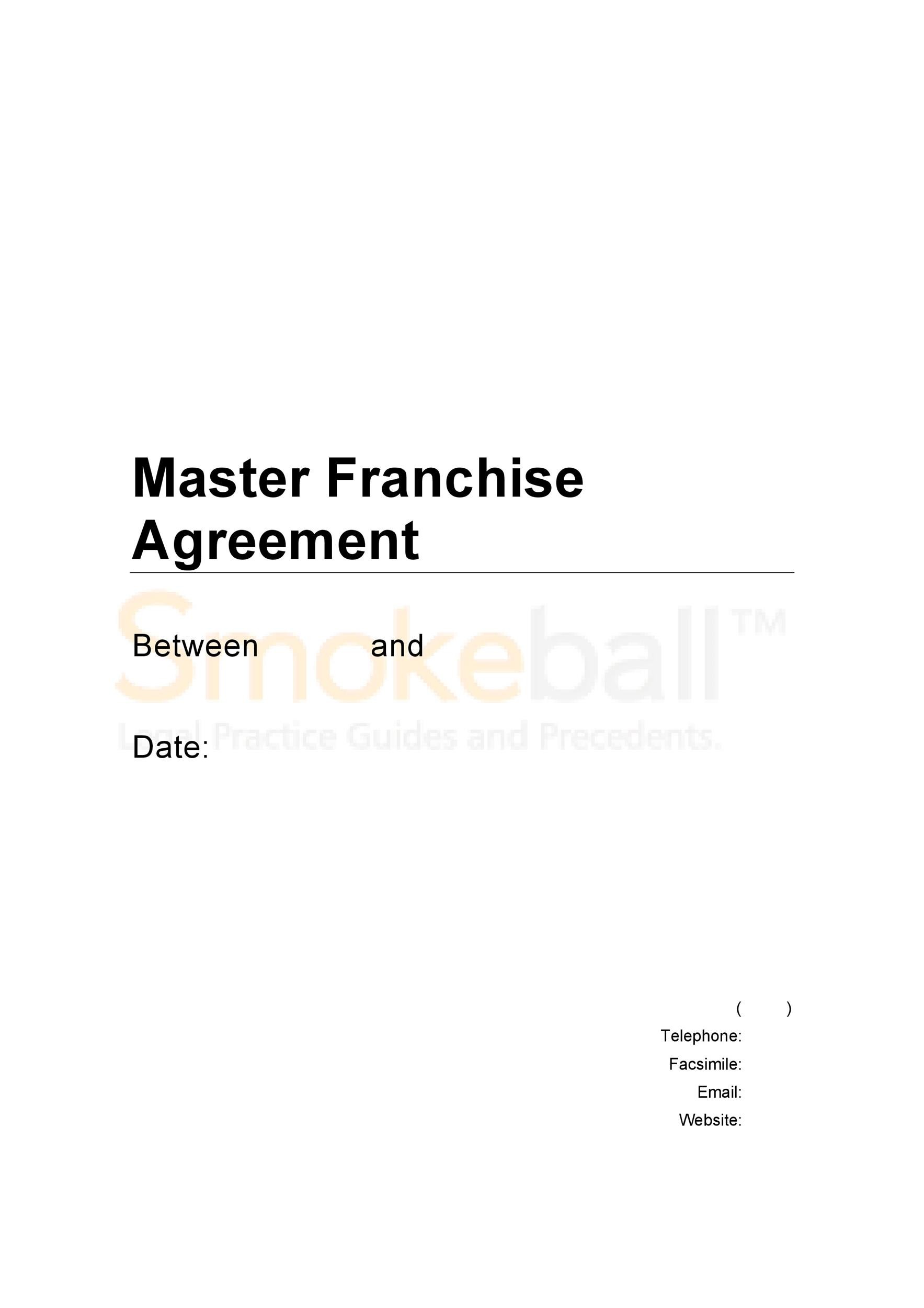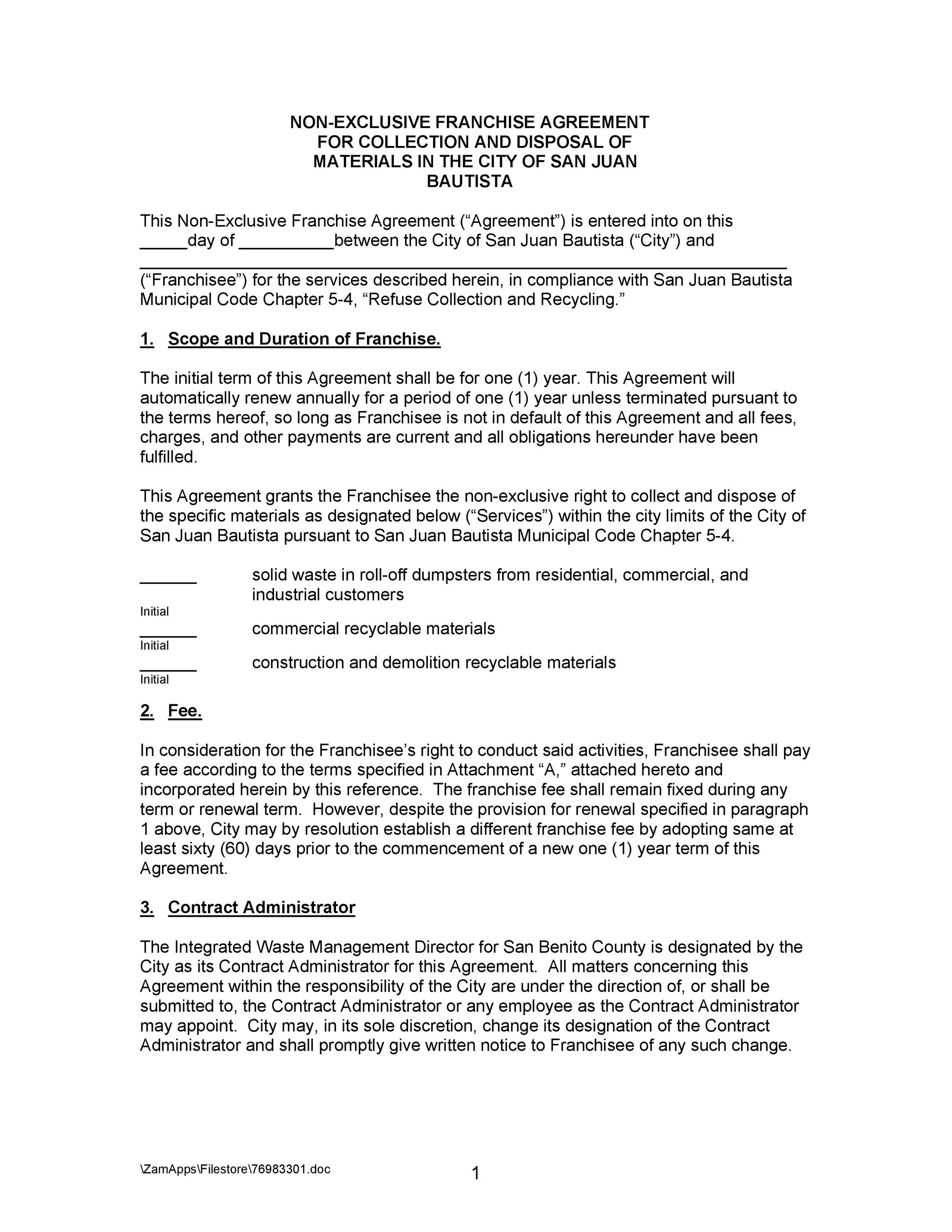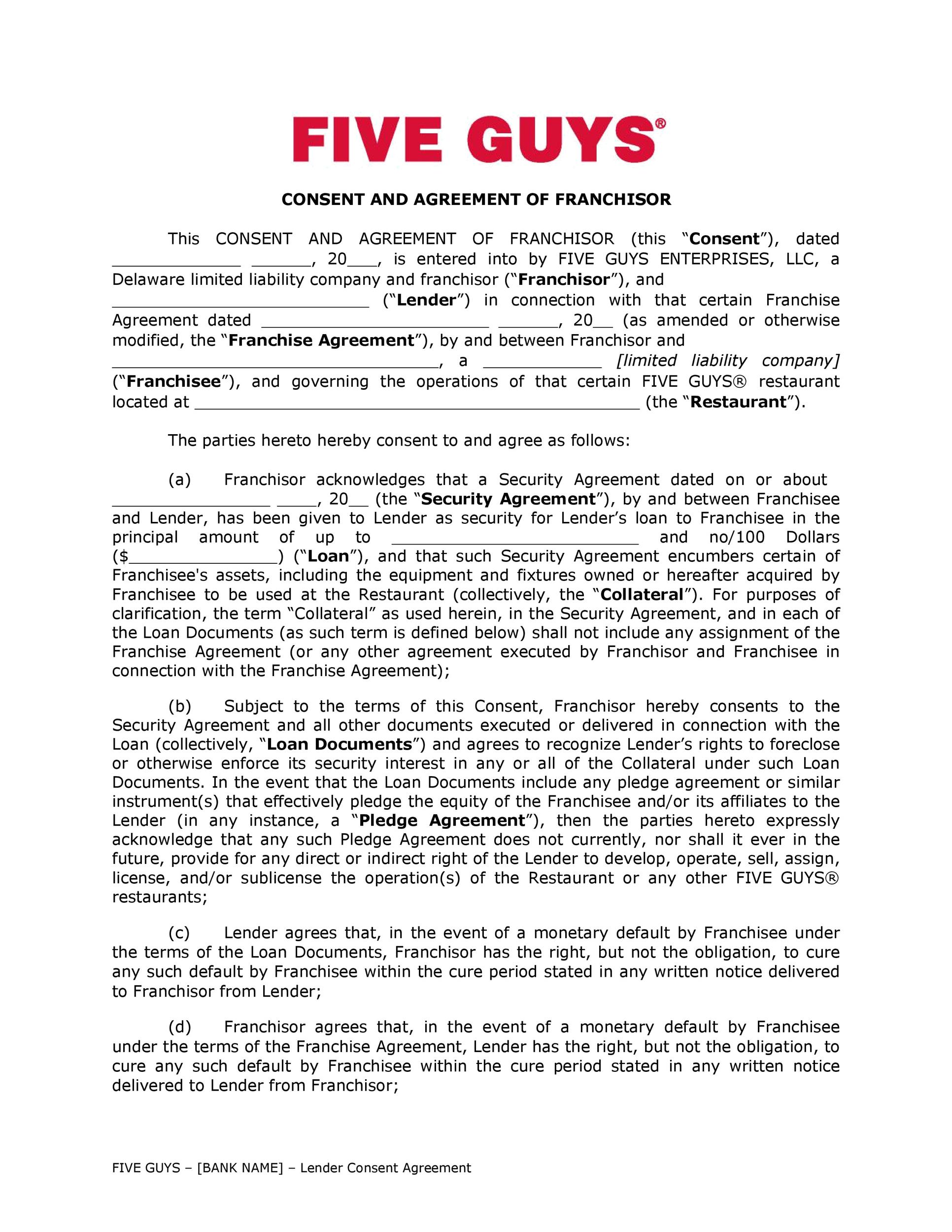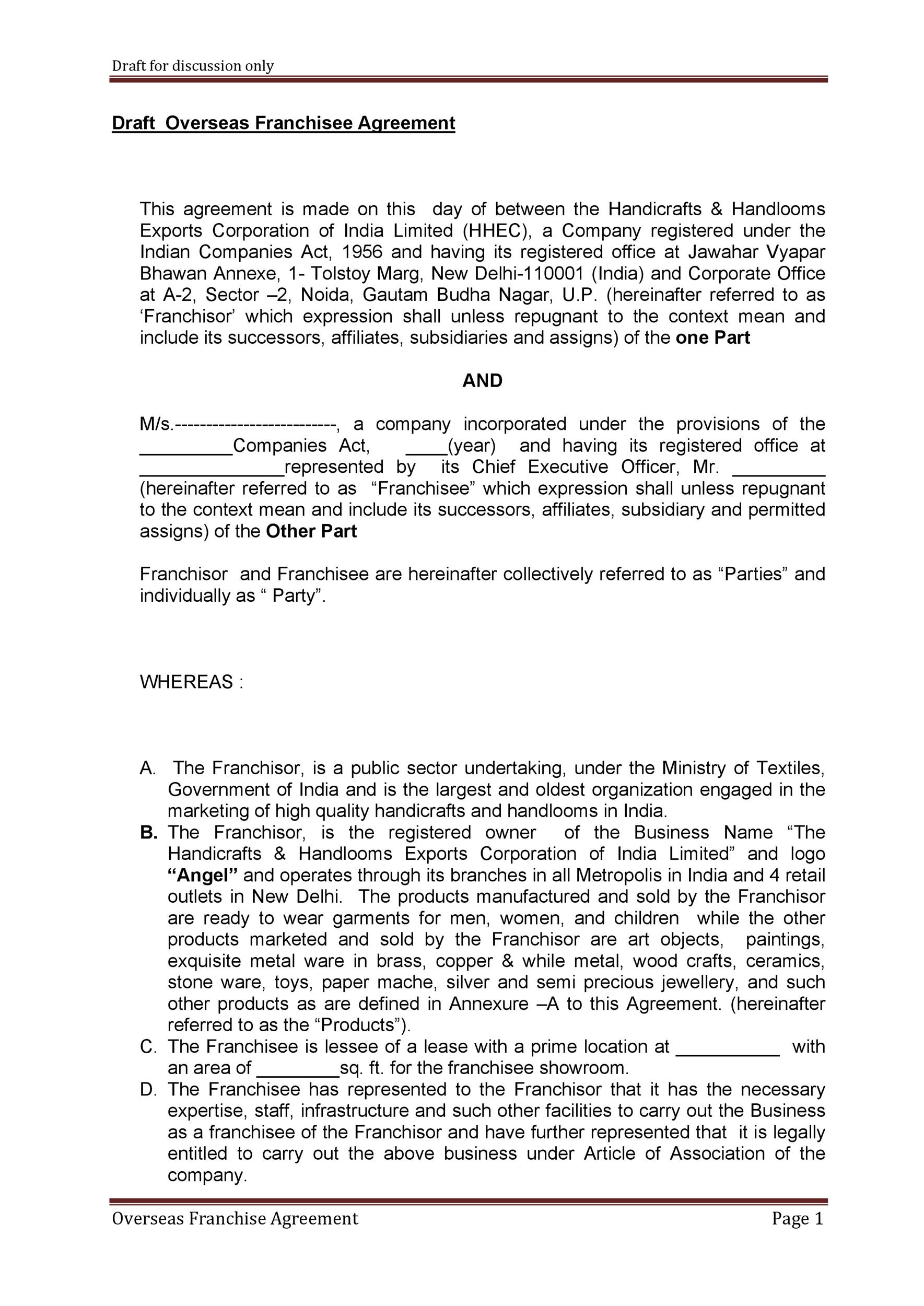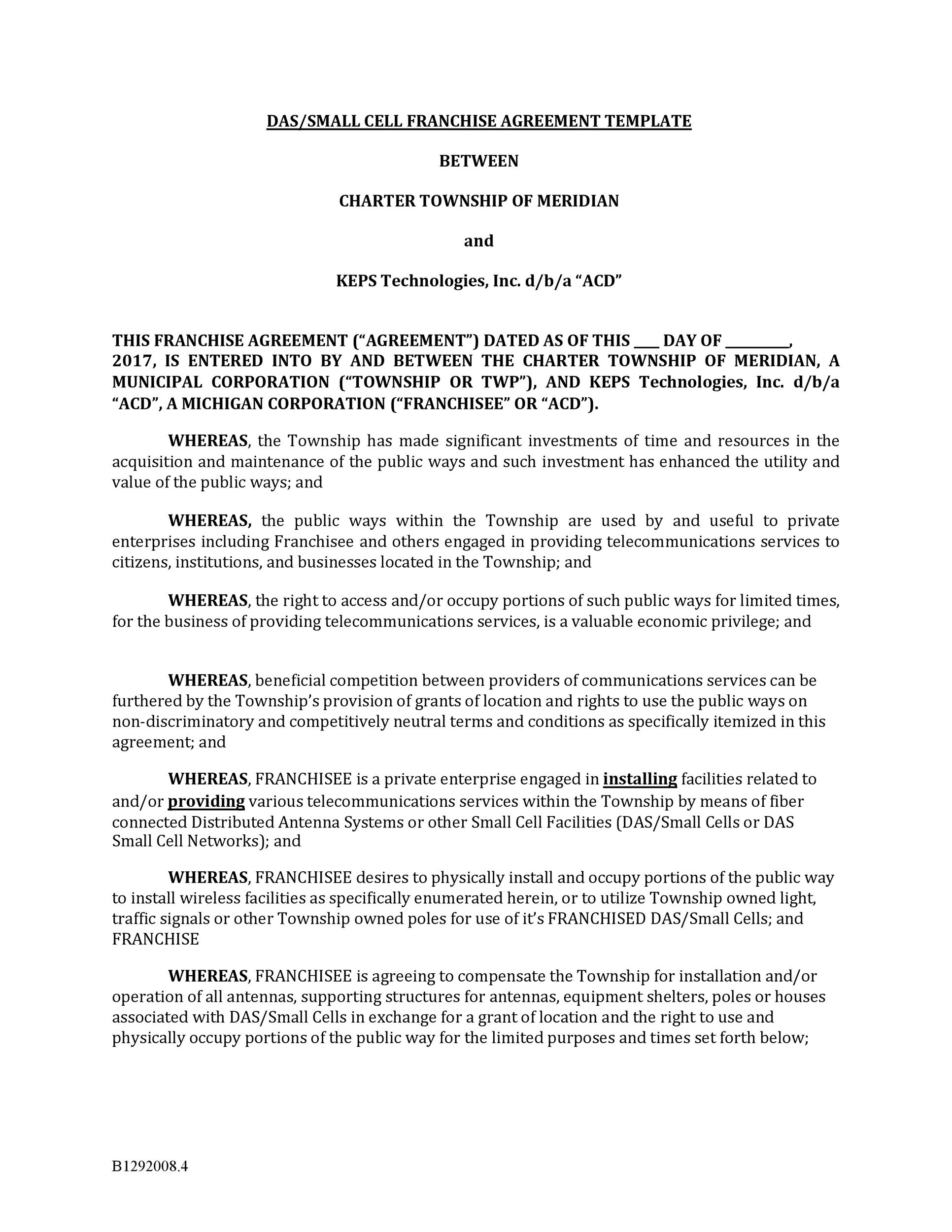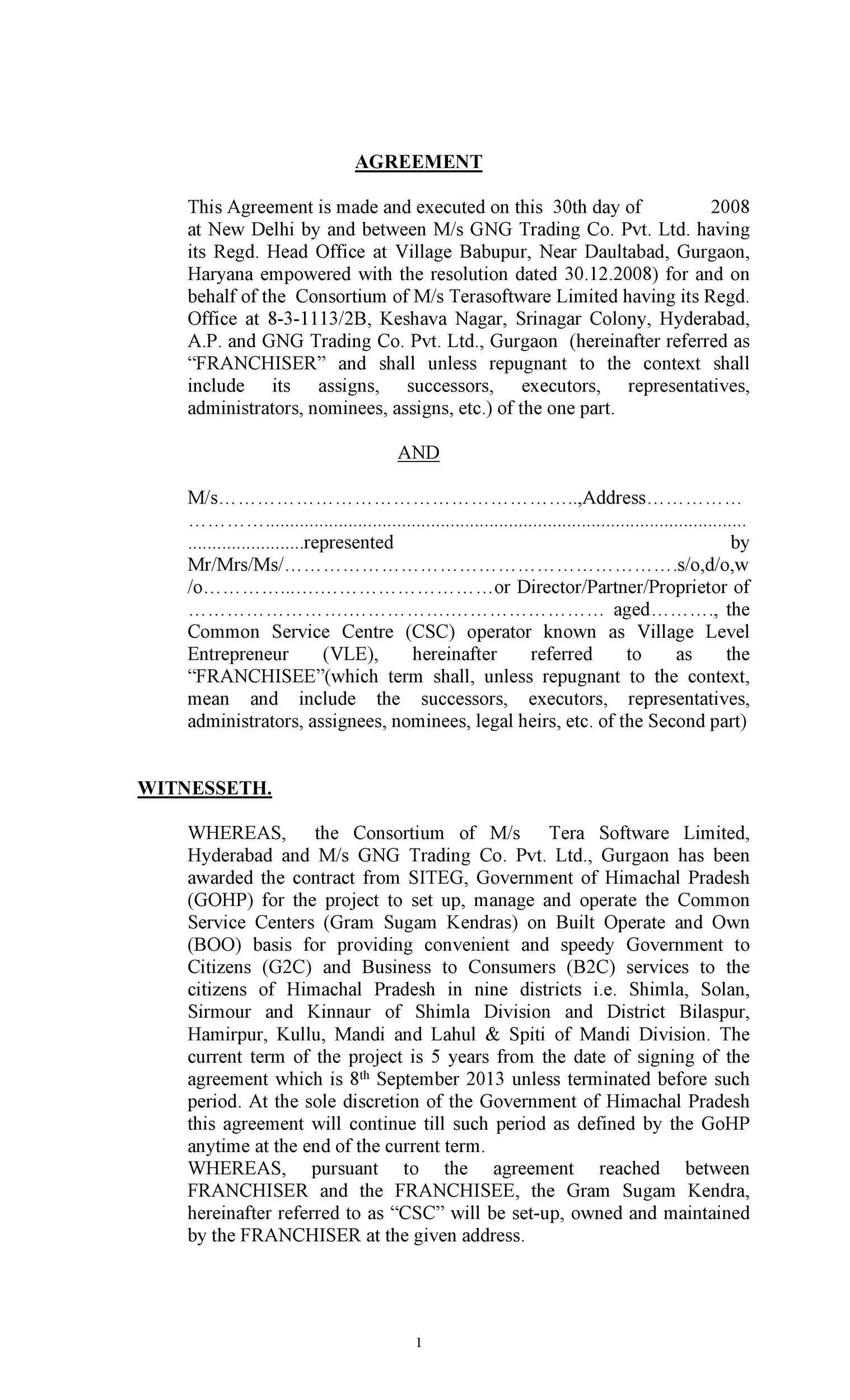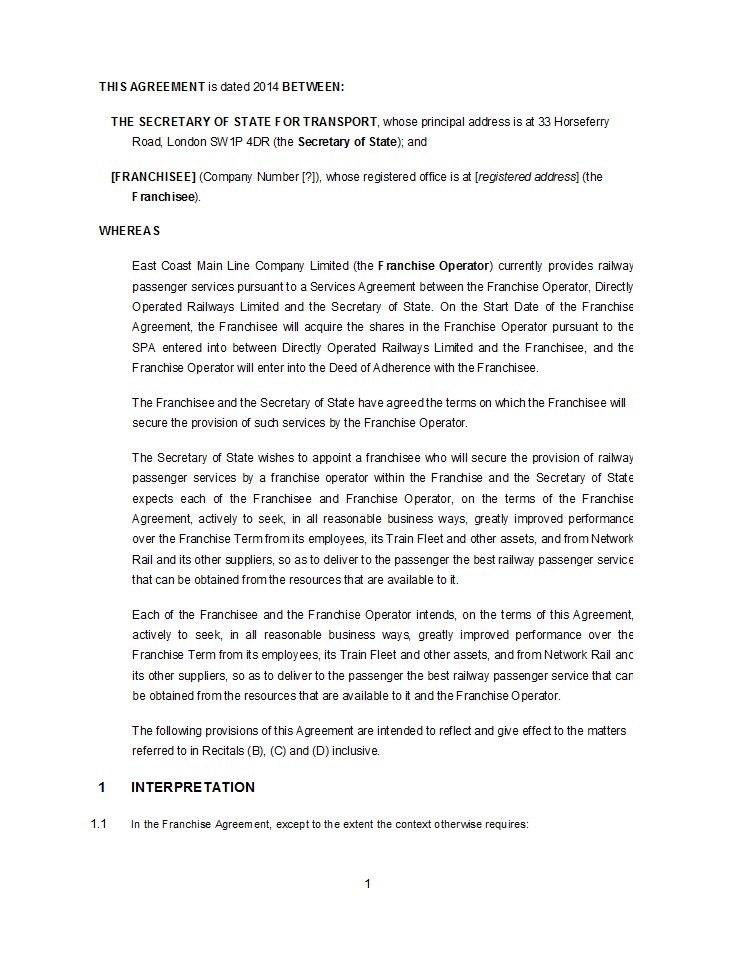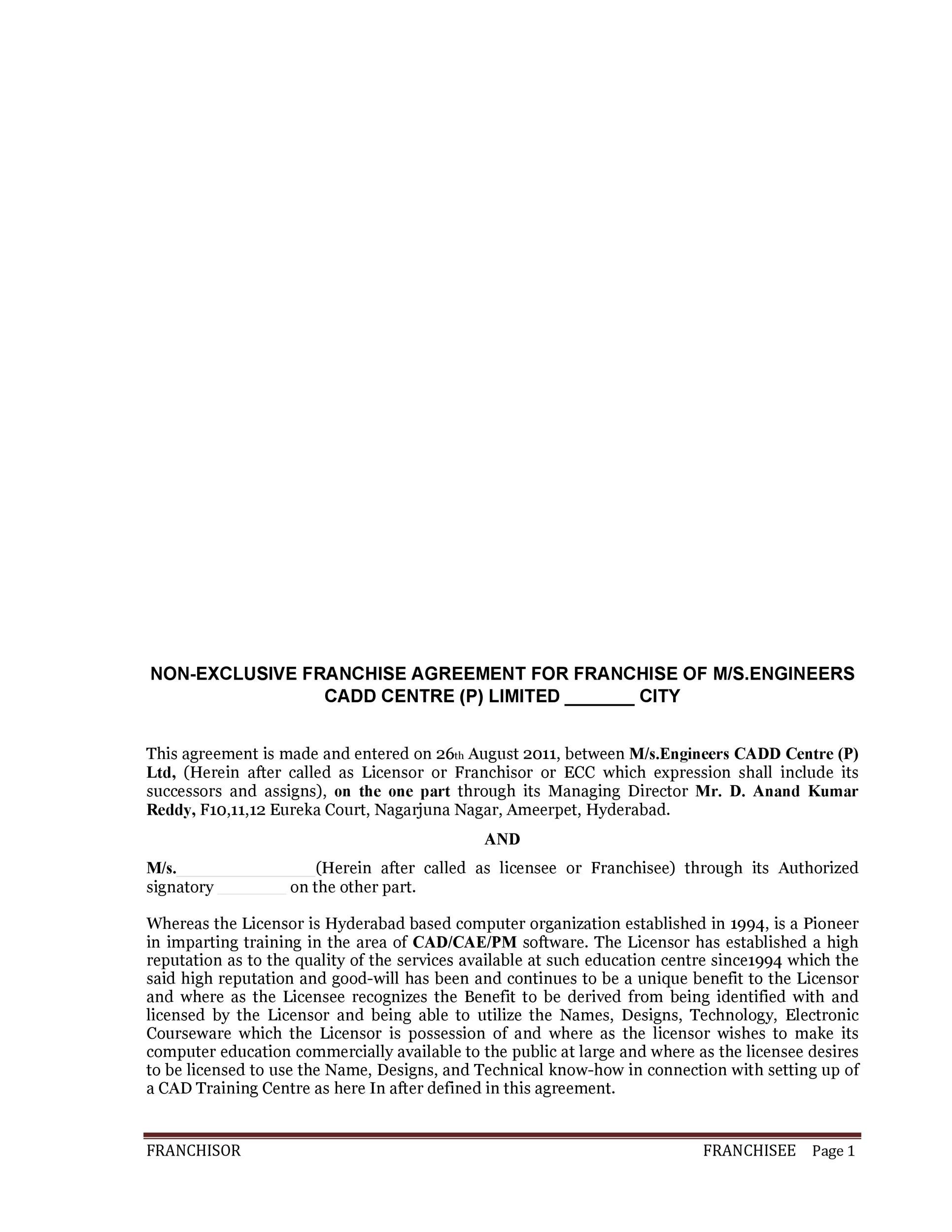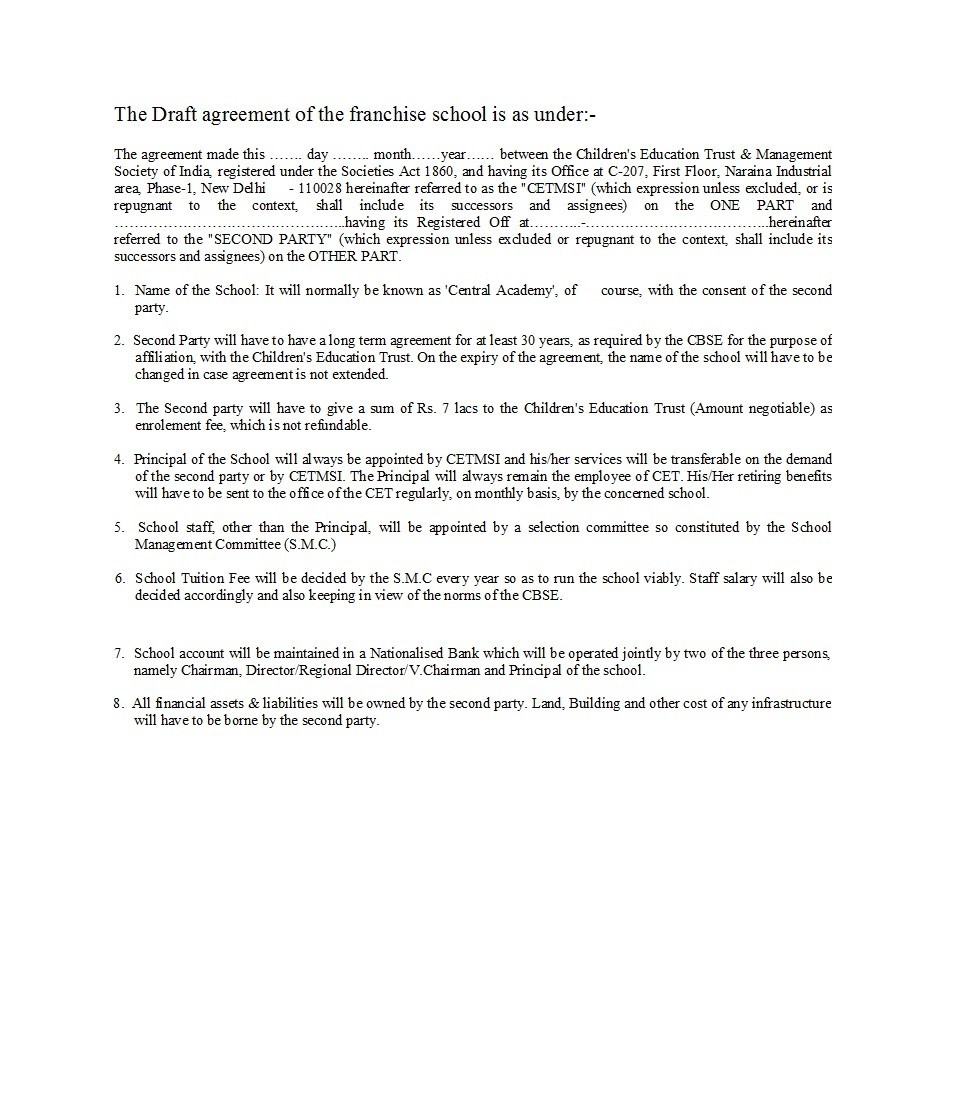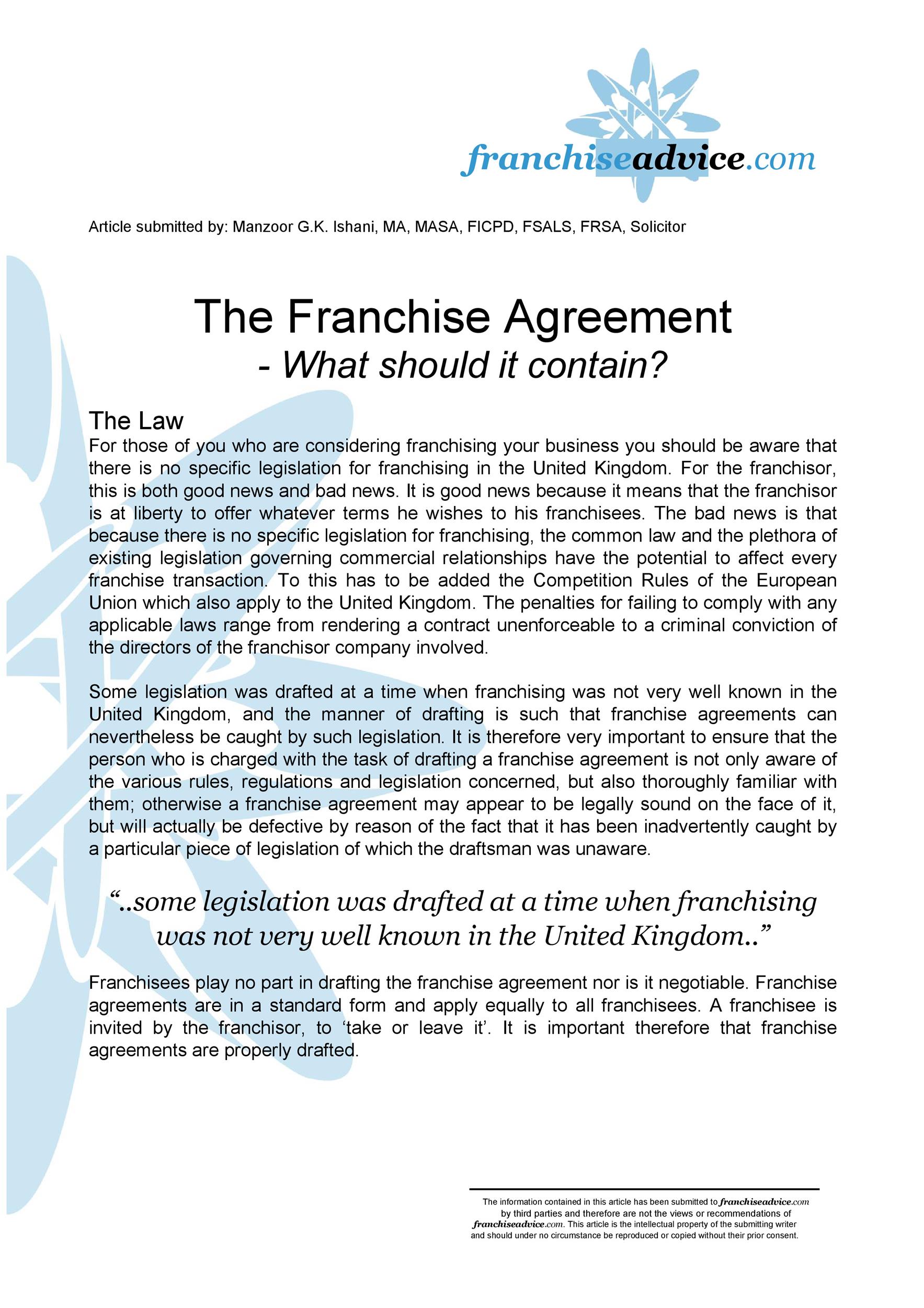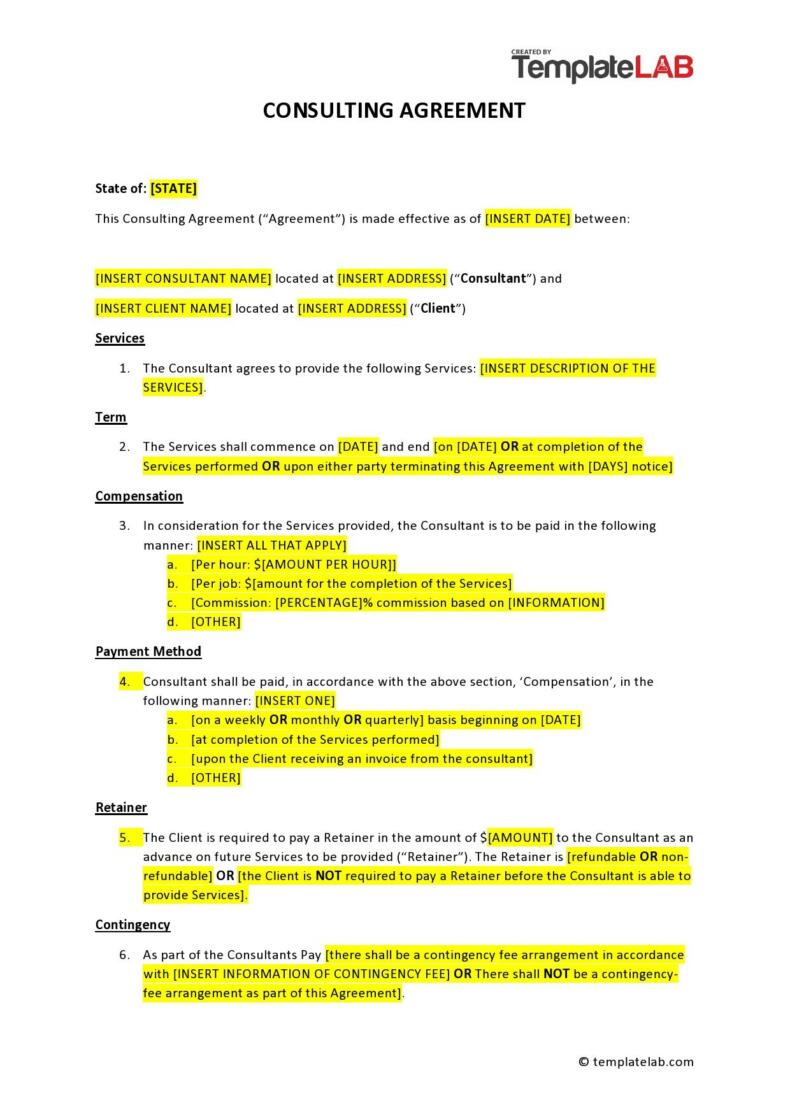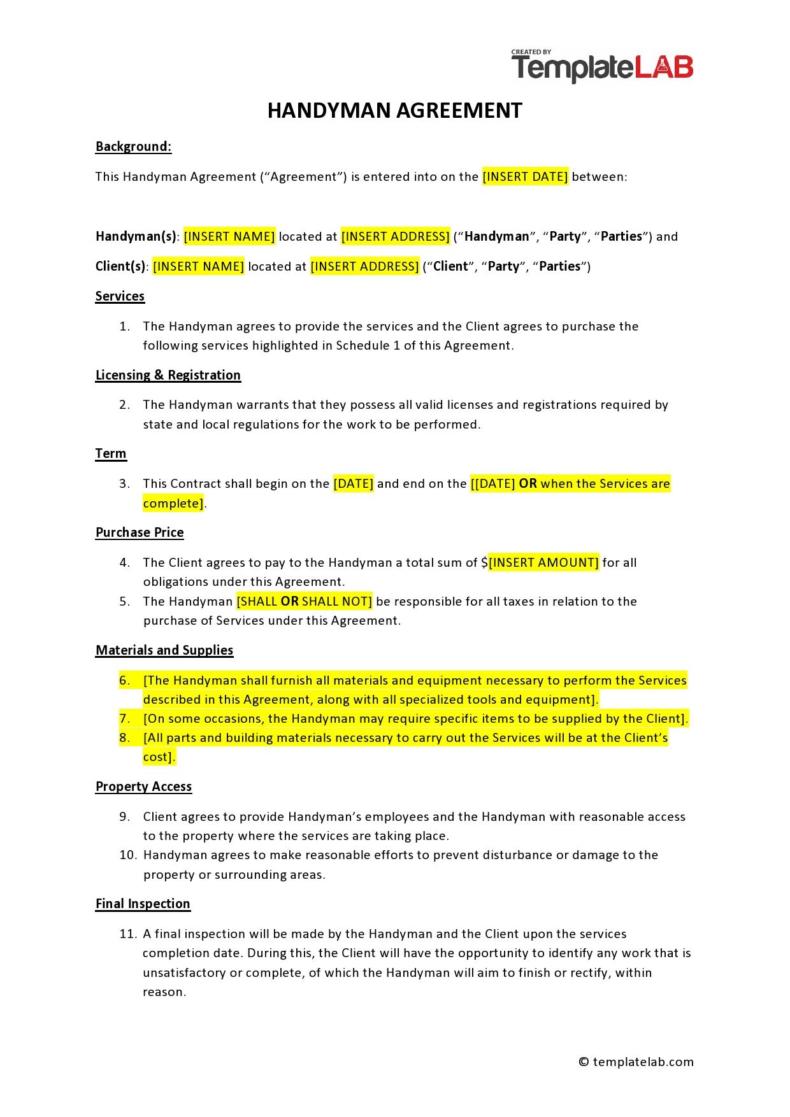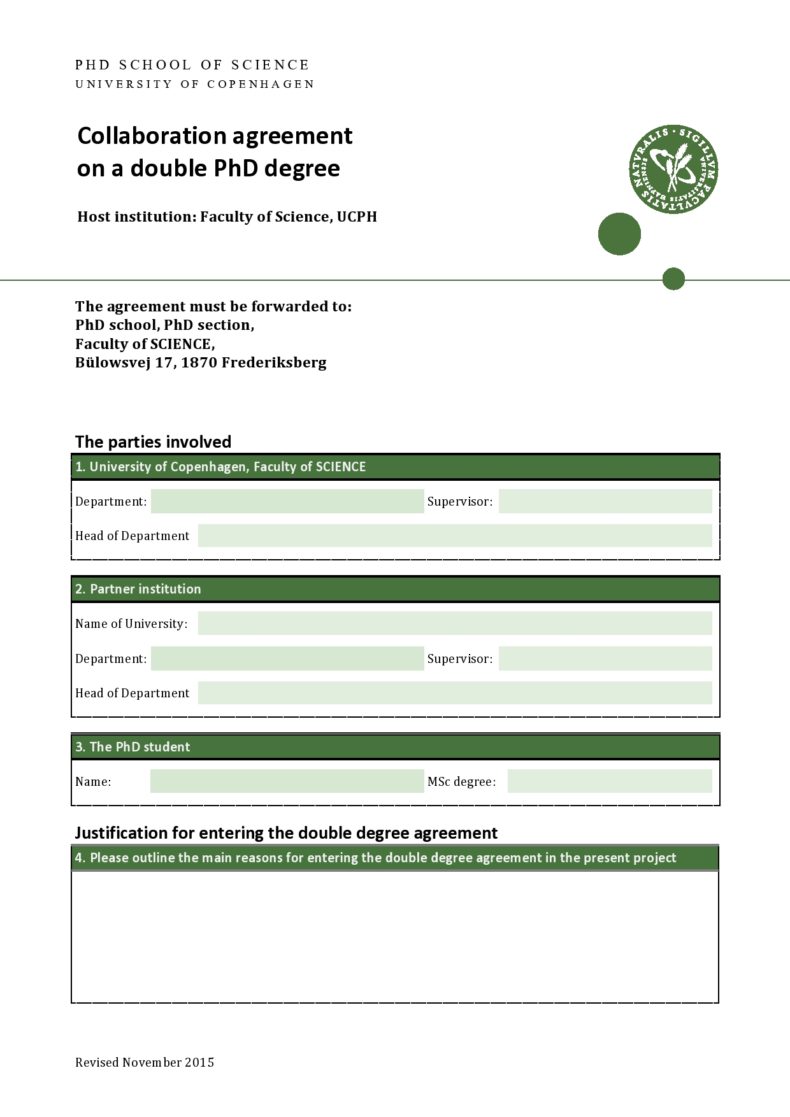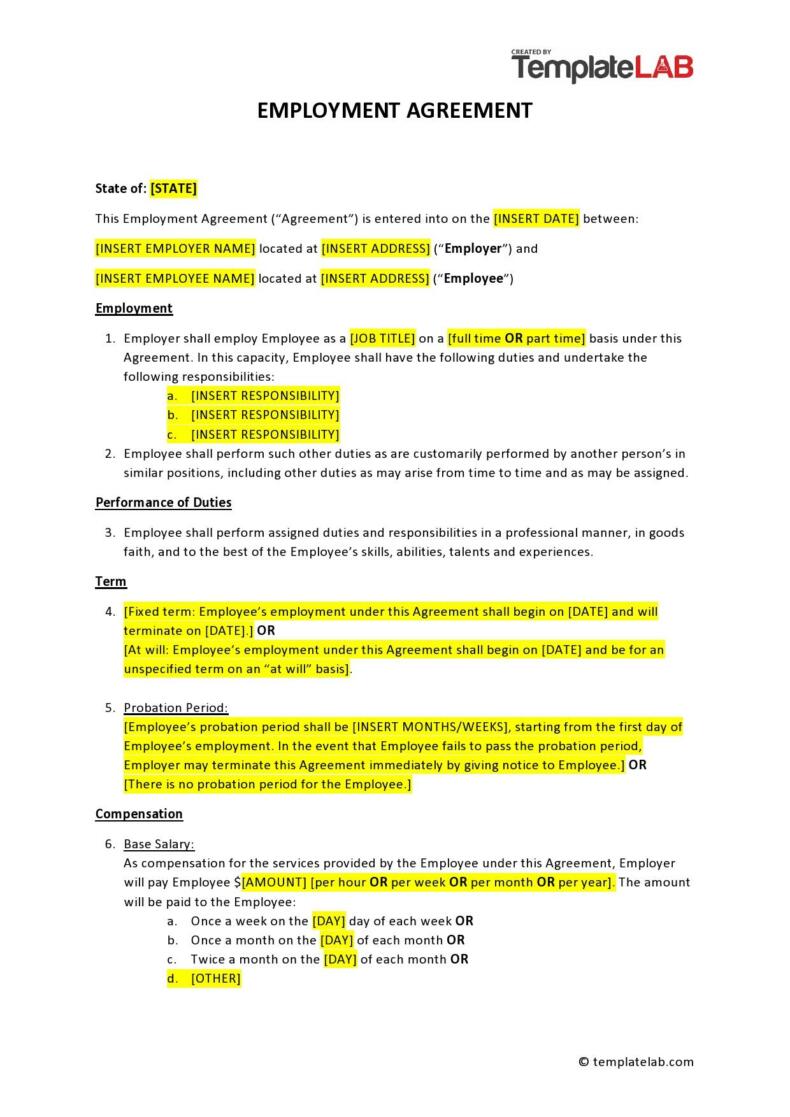A franchise agreement is a legally binding document which contains information about the terms and conditions set by the franchisor for the franchisee. A franchise agreement sample also contains an outline of the obligations of both the franchisor and the franchisee. When both parties agree to the terms of the contract, they both affix their signatures.
Table of Contents
- 1 Franchise Agreements
- 2 What is a franchise agreement?
- 3 Franchise Agreement Templates
- 4 How does a franchise agreement differ from a license agreement?
- 5 Franchise Agreement Samples
- 6 Contents of a franchise agreement
- 7 Franchise Contracts
- 8 How to get out of franchise agreement?
- 9 What is the most common termination statement in a typical franchise agreement?
Franchise Agreements
What is a franchise agreement?
In a franchise agreement, the entity who owns the franchise or the “franchisor” grants the other entity or the “franchisee” the right to make use of the proprietary marks and system to operate the business or franchise. In most cases, the agreement limits the franchise to a specific location so the franchisor cannot relocate to another area.
The franchise contract must also specify the amount of the fee the franchisee must pay. This may include an initial fee and ongoing royalty payments. Before signing, the franchisee must understand everything written on the document including any restrictions and provisions stated therein.
Franchise Agreement Templates
How does a franchise agreement differ from a license agreement?
A lot of times, people confuse franchise agreements with license agreements. Although similar, these are very different documents. There are three main factors which turn a license into a franchise:
- The business of the franchisee is significantly associated with the brand of the franchisor. When it comes to franchising, the franchisor and all the franchisees share a single brand.
- The franchisor assists with and controls the actions of the franchisee, especially when it comes to how the franchisee uses the franchisor’s brand when conducting business. However, the franchisee is still an independent contractor which means that the franchisor’s control is only limited to maintaining the brand standards, not to how the franchisee manages its business.
- The franchisee pays a specific fee to the franchisor to receive the rights of the franchise. This fee depends on what the franchisor sets at the beginning of the agreement. Keep in mind though, that there is a number of exemptions with regards to this fact as provided under the law.
For a license agreement, the licensor allows the licensee to use his property for business or for any other reasons. License agreements have their own specific terms and conditions too, but the content differs from that of franchise agreements.
Franchise Agreement Samples
Contents of a franchise agreement
Just like franchises differ from one another, franchise agreement templates differ as well in terms of content, language, and style. One thing they have in common is that franchise agreement samples contain “covenants” which are the rights, duties or promises that the franchisor owes to the franchisee and vice versa.
Here are the basic covenants to include in your franchise agreement:
- Grant of Franchise
This section states that the franchisor grants the franchisee a non-transferable, non-exclusive, and limited right to use its logos, trademarks, services, and the system of operation for a specified amount of time as defined by the agreement. Also, this section contains a statement about how the franchisor has the right to terminate the agreement in the case of a breach of contract. - Franchise Details and Rights
This section contains information about the territory of the franchisee. It also includes a timeline by which the franchisee must find the physical location for the franchise all the way until it opens. This section may also include other information like the equipment needed for the business and more. - Required Purchases and Fees
This section includes all of the required purchases and fees that the franchisee must pay for the rights to the franchise. Some examples of fees include an initial fee, fees paid to the franchisor before the opening, royalties, advertising fees, and more. - Advertising
This section contains the advertising obligations of the franchisor to promote the brand. - Term and Renewal
This section includes the length of the franchise agreement’s term. It starts from the date both parties sign the agreement to the date of the agreement’s expiry. If the franchisor grants renewal rights, the terms are also included here. - Services Offered by the Franchisor
This section contains information about pre and post-opening services which the franchisor offers to the franchisee. If you’re a franchisor and you plan to include this covenant in the agreement, make sure to draft the statements properly. - Protection Information
When it comes to franchises, the franchisor only grants a temporary license to the franchisee. Therefore, it’s important to include protection information in the agreement which identifies each of the items which make up the confidential, trade secret, and proprietary information of the franchisor. Also, state the limitations placed on the right of the franchisee to utilize this information. - Training
This section includes any information regarding training that the franchisor offers to the franchisee. It also includes any supplemental seminars, meeting, training, and the like that the franchisor either urges or requires the franchisee to attend. - Quality Control
In this section, the franchisor addresses the specific quality-control requirements of the franchisee. This is very important to guarantee that the products and services offered by the franchisee meet all of the standard requirements of the franchisor. - Transfers
All franchise contracts contain this covenant wherein the franchisor controls the franchisee’s right to transfer in the franchise relationship. In this section, make sure to enumerate all of the prerequisites of a transfer. - Limitations on Complaints, Damages, and Defaults
In this section, discuss the violations of the agreement which you will treat as a breach of contract. You may divide these breaches into categories depending on their severity. Also, include any consequences of the breaches like penalties, termination, and others. - Obligations Upon Termination or Expiration
When the franchise relationship ends, there must be specific steps which the franchisee must take to “de-associate” his association with the franchisor’s system. Include these steps in the franchise agreement as well. - The Right of the Franchisor to First Refusal
Some agreements provide the franchisor with the option, not the obligation to exercise this right. This is important in cases where the franchisee wants to transfer his franchise or when the agreement gets terminated or expires. - The Relationship Between the Franchisor and the Franchisee
Here, it’s specified that the franchisee is an independent contractor and not an agent or employee of the franchisor. This means that the franchisee owns the business. Therefore, the parties involved in the franchise contract make their own hires, deal with their own employees, pay the taxes of their own businesses, and operate independently overall. - Indemnification
This section contains information about how the franchisee must reimburse a certain amount to the franchisor for losses suffered because of the franchisee’s wrongdoing or negligent act. Usually, such a covenant is one-sided and it always benefits the franchisor. - Non-Competition and other Similar Restrictions
The purpose of this covenant is to prevent any of the franchisees from starting a business which competes with the one franchised. There are two parts to this covenant namely the “in-term” and the “post-term.”
The “in-term” covenant states that the franchisee must not compete against other franchisees or the franchisor while the franchise agreement exists. Conversely, the “post-term” covenant states that the franchisee mustn’t open a competing business after the expiration of the agreement or after earlier termination due to a breach of contract. - Dispute Resolution
This section contains information about any methods the franchisor employs to deal with the disputes of the franchisees. These methods include nonbinding-mediation requirements followed by binding-arbitration requirements. - Insurance
All franchise contracts must require the franchisees to acquire some insurance to cover business operations. Also, these insurance policies must include the franchisor as “additional insured” to provide the same coverage as the franchisee.
Franchise Contracts
How to get out of franchise agreement?
In some cases, franchisees decide to get out of their agreement. However, it’s not that simple, especially if your franchise agreement template doesn’t have a clause for termination. However, a franchisor has the right to terminate the franchise agreement if the franchisee:
- gets convicted of any kind of crime;
- loses an essential lease or license;
- doesn’t pay the royalties;
- doesn’t correct defaults even after receiving notice;
- becomes insolvent or goes bankrupt;
- isn’t able to follow the requirements of the franchisor regarding appearance and location; or
- isn’t able to comply with the required business operations.
Conversely, a franchisee also has the right to terminate the agreement if the franchisor:
- doesn’t provide support and training as indicated in the agreement;
- misrepresents the profit potentials or commits fraud;
- doesn’t protect the territory or business opportunity of the franchisee; or
- becomes insolvent or goes bankrupt.
Of course, there are other terms you can include in your franchise agreement template as you see fit. For instance, you may want to include the financial and legal consequences of the franchisee if he just abandoned the franchise.
What is the most common termination statement in a typical franchise agreement?
When you create a franchise agreement, including a termination statement or clause is also important. Usually, such clause includes statements for either the franchisor or the franchisee to:
- suspend the performance under the franchise contract where there’s a material breach by either party; or
- terminate the franchise agreement after a material breach which doesn’t get resolved within a specific amount of time.
A “material breach” refers to an event wherein one party doesn’t comply with one of the contract’s provisions.

